#trying to work through my issues with TFP and s4
Explore tagged Tumblr posts
Text
Post s4 feelings, and what to do with them
So, it’s been a week or so of hiatus. And I have feelings that I don’t know what to do with. So I decided to put them in a post, to maybe try and work through them. For anyone who cares, read more under the cut (fair warning, it gets long and rambly).
I’ve been holding off on writing this post, writing about how I feel about s4, and TFP in particular. I’m still feeling a bit mindfucked, not only from the TFP, but from series 4 in its entirety. I’ve needed quite a bit of time to work through it all, mostly by talking to others and reading (both positive and negative) reactions and metas.
During the last week, I’ve seen a lot of unreasonable negativity, and even hate, directed both at the episode and the writers. I don’t want to contribute to negativity in any way. That’s not where I’m coming from. I don’t hate this show, or TFP. I don’t feel angry at the writers, and I don’t think they owe me anything. I’m in complete understanding that this is their story and that they’re entirely entitled to take it in whatever direction they want to. I still respect Moffat and Gatiss as writers, and I’m still grateful to them for creating the only show and characters that’s been able to capture my interest to this extent. So sincerely, a big thanks to Mofftiss for making this show.
That being said, series 4, and TFP, has left me feeling bereft, wanting and a bit disillusioned. More surprisingly, I feel more than a little indifferent to it. I was, naively probably, hopeful that this series, and this episode, would finally provide me with some highly anticipated closure, wrapping up of loose threads and resolution of plotlines. It didn’t. It just didn’t give me what I needed as a viewer, and I’m a bit sad about that, for my own sake. The fact that it was loved by others, and provided them with what they needed is great. Well earned after the ride we’ve had.
What I did like about TFP and s4 So, Mofftiss decided they were going to do an “origins” story, showing us how Sherlock became the man he is when we meet him in ASiP, and his journey from a “great” man to a “good” man. That is actually one of the things I like about s4 and the episode; watching Sherlock’s progression from a “great” man to a “good” one. Getting to the stage where he’s finally able to embrace emotions as good and healthy, allowing himself to love, and have a family and friends.
I liked that in the end, it’s his ability to show emotions like compassion and love that’s key to solving the final problem. His newfound understanding of emotional context and insight into Eurus’ emotions is what makes him realize that threatening to shoot himself is the only way to get her to stop her game. The same way his own ability to show her compassion allows him to save John. I also liked that the show gave Eurus, the-villain-who-isn’t-really-a-villain, the best resolution she could get; the attention and love she obviously didn’t have as a child. And I really appreciated that Sherlock is able to give her life some sort of meaning by visiting her and playing the violin with her, now that she is ‘beyond words’.
Outside of Sherlock’s own growth, I enjoyed the new information and the insight we got into Mycroft’s character, a look behind the Iceman façade. And finally, the way the relationship between the Holmes brothers evolved, that was probably my favourite part of the episode, actually.
My problems with TFP On to the problems I have with this episode. Which are many… So while I liked the theme and the underlying message of the episode, I just can’t bring myself to appreciate and accept the wrapping it came in. No matter how much I want to. I feel that TFP kept tossing new plot points at me and didn’t allow me time to connect with the characters. It made the entire episode seem so rushed, so hectic, that most of all it just left me numb and unable to care about it the way I probably should (and I see others do).
First off, I’m not really a big fan of horror movies and dark, psychological thrillers. Which is what this episode feels like for me, most of all. I feel like we got off on the wrong foot, TFP and I. From the opening sequence and the set-up of Mycroft, complete with a scary clown and a little girl in pig tails, via the dismissal of TLD’s cliffhanger with a single sentence, to the point where Sherlock, John and Mycroft escaped an explosion unscathed - none of that even resembles any sort of reality I am willing to, or able to, accept. So already within 2 minutes I was shaking my head, frowining and going “wtf am I watching?”
See, I’ve no trouble accepting that this show is larger-than-life and that the characters’ actions and abilities are beyond real life. But I’ve still always thought of it as a form of “heightened reality”, somewhere at least close to what could happen in real life. That was part of the fascination with it, it felt “almost real.” Unfortunately, too much about this episode was too unbelievable, too fantastic, and exceeded my tolerance level for suspension of disbelief (I think maybe I used it all up when I had to accept Mary being faster than a bullet back in T6T…?).
My biggest issue when it comes to suspending dibelief, is that Eurus is made out to be something resembling a comic-book super villain. Her abilities are nearly magic and the Sherrinford facility is practically Azkaban. (The setting is another thing that made me feel disconnected from the show I know and love. I miss London!) That being said, I know that most of the questions my brain keeps hurling at me about improbabilities and plot holes and -developments, can be answered quite simply. What’s happening is possible because Eurus wants it to happen. Because Eurus can make it happen. Because the writers decided that Eurus can do all those things.
I’m just really struggling to feel any sort of attachment to Eurus as a character. To me, the fact that Eurus wasn’t even the lest bit foreshadowed, except for the cryptic “you know what happened to the other one” remark in HLV, made her feel like a random add-on. I couldn’t, and didn’t have time to, relate to her. In making her a full-blown psychotic, who veers between high-functioning enough to sneek out and play dress up with John and Sherlock and breaking down completely as the game comes to an end, it’s hard for me to deal with her like a real person and connect with her on any level.
I think a part of the problem is they didnt’ dedicate enough time to show me how Eurus did what she did. Mind control, manipulation and suggestion are of course real things, I don’t doubt that. But this set-up demands of me to accept that Eurus is so intelligent that she can do all of these things just by a short conversation with someone. And her abilities are so great that she has the whole facility reprogrammed, to the point where not a single person at any time is able to raise the alarm. Moreover, I’m struggling to get a grip on how exactly Eurus got those abilities? And how does a five-six year old girl become so evil that she tortures her brother and kills his best friend? That’s just too close to a horror movie to me.
At least Jim Moriarty’s games always seemed within the realm of human abilities, because we know he spent years and years of his life building a vast criminal empire, making himself the spider at the centre of it, pulling the strings. Eurus apparently climbed out of the womb as an “incandescent, era-defining genious, beyond Newton”, because after being sent away from early childhood, I have to believe they didn’t supply her with access to an education, books, electronical gadgets etc? She’s spent all her life on an isolated prisoner island, her cell stripped, but still she appears to have endless resources. Again; I just have to accept she can use her almost magical, superhuman skills, because she can. I just wish the writers would have helped me along by showing me at least a little of how she does it, instead of just telling me she can.
The suspension of disbelief part aside, I think I would have been able to accept the secret sister scenario as plausible in this larger-than-life universe, if there had been some sort of build-up to the reveal of her existence. Honestly, I need more than a five minute set-up for the the reveal that Sherlock has a secret, forgotten, dangerous, revenge-seeking sister, who is smarter than her brothers combined.
Since we didn’t have any hint of anything amiss until Mycroft’s cryptic “you know what happened to the other one” comment in HLV, I didn’t have any emotional connection to Eurus when she finally showed up right at the end of TLD. And show me a little more of Sherlock’s motional response to finding out his entire personality as a grown up is caused by a childhood trauma, show me a little bit of coming to terms with it before rushing off to Sherrinford. The lack of build up and reaction to the Eurus reveal makes the episode feel rushed. I think if the characters had been allowed to react and respond to the plot, the plot itself would have felt more plausible.
Then there is the attempt to tie Eurus into Jim’s game, or him to her game. That seemed a bit forced to me. Jim was set up from episode 1 as Sherlock’s arch-nemesis (as he also is in ACD canon), and killing him off already at the end of s2 never made sense to me. I think the writers always planned for him to die in TRF, but then realized too late they should have saved it for later. So now Eurus feels like an attempt to fill in the gap he left behind. And it might even have worked, if there had been at least a few hints of a presence even bigger than Jim from the beginning.
But there were no hints of foreshadowing. And to me, the way they retconned Eurus into Jim’s story only amounted to diminish the best baddie they ever created on this show. And the way they did it, they turned him into something of a bizarre fun house effect? I love the beach scene and his combination of power play, not having any fucks to give and amusing himself – but I’m not sure I’ll ever be able to watch those pre-recorded messages without physically cringing. (With the exception of the last one: “Holmes killing Holmes. This is where I get off.” That one works, because it’s a genuine message to Sherlock.) Those messages seemed too cartoonish, too random, and drew my attention away from what were supposed to be tense situations of life and death. The real drama came from what was going on in whatever room they were in, not from Jim’s “tick tick tick”s or “choo choo”s. They weren’t even directly linked to the tasks Eurus set. I’ll never understand why the writers felt this was a good way to go. But hey, that’s just me.
After this episode finally laid to rest the question of whether Jim’s dead or not, it feels like his character has been continually used as a plot device for future episodes. The writers have included him to tease the audience that they may bring him back, and to use people’s interest in him, without actually having any intention of brining him back. Ever since they killed him off in s2, they’ve tried to fill in the gap with villains that Sherlock every time claims to be even worse and more scary than the last. The problem is, I don’t have any of the emotional connection to them, nothing to make them as interesting as he was? To play around with the idea that maybe he’s not dead after all, keeping him in the story in various ways, only to confirm that yes, he’s been dead for real all along…? I was confused and saddened by how they chose to solve this plotline.
I think the retcon they chose to go with for TFP lessens Jim’s impact and importance. In some ways, I’d actually rather they’d left him out of TFP completely. I mean, they’ve even said in interviews “…it only occured to us late on that we could do that.” So it was clearly not a part of a grand plan from the beginning. And now they’ve tampered with my ability to enjoy my favourite episode. Whenever they’re on that rooftop, I’ll be thinking of the fact that in some near past, Jim’s been at Sherrinford, talking to Eurus for five minutes, recorded some weird video messages for her and set in motion a whole other game. It just somehow diminishes the effect of that scene for me. I’m gutted about that.
I know most of the big names in the fandom feel like it’s the best thing for Jim, and for the story, that he’s dead. I partly agree, and partly don’t. Because yes, Jim was always sad, desolate and lonely, and probably didn’t intend to live to reach old age. But on a very personal note for me, I want to and need to believe that even for Jim Moriarty there are things in life that make his pain bearable, things that are valuable enough to go on. I’m of course talking about his connection with Sherlock. I want Jim Moriarty to have some human closeness in his life (I won’t go on and on, I already did that in excess in another post). If anyone thinks holding this view means I’m doing Jim Moriarty and his arc a gross injustice, or that I don’t understand him at all, go ahead. I respect other people’s right to interpret his character and his motivations the way they see fit, and I’ll allow myself to interpret him the way I do.
Okay, moving on from Jim (oh, how I wish that was truly possible…) The murder rooms scenario, the game Eurus sets up for her brothers and John. I just can’t (not on first viewing, not on second or third) get emotionally attached to it. At no point since the girl on the plane was introduced did I ever think she would survive (and haha, clever plot twist, turned out she wasn’t even real), and to be honest I couldn’t even care much about what happend to her, no more than I could care about the three Garridebs brothers being dropped into the water.
To me, Sherlock, John and Mycroft all seem too willing to just accept the rules of the game. That just doesn’t sit right with me, given how straight from the beginning it’s clear that Eurus won’t follow the rules of her own game. For god’s sake Sherlock, didn’t you learn anything on that rooftop? Villains don’t play by the rules. And Mycroft at least, who’s very aware of Eurus’ abilities when it comes to playing mind games, should have suspected that the girl on the plane was fake. But he didn’t, and so the three of them moved through the rooms as ordered by Eurus. The problem is, I didn’t really feel too worried about the outcome. The only scenario I felt slightly emotional about, was the one with Molly. Brilliant acting by Loo.
So by the time they get to the last room, the “Holmes killing Holmes” scenario, my brain couldn’t stop screaming at me that they should all know that they have no real reason to keep playing Eurus’ game. I kept waiting for Sherlock and Mycroft to at least try to use their “deduction thing” to figuring out a way to get all of them out of the situation alive. There was literally not a single cell in my body believing Sherlock would kill anyone in that room. That lack of emotion got in the way of fully appreciating Mycroft’s heartrendering sacrifice, his efforts to minimize Sherlock’s pain in making an impossible choice. I don’t know, but I’m pretty sure I didn’t feel what I was supposed to feel by this point in the story. And the fact that it’s set on a dysmal, isolated prison island also kept it from feeling real. I missed the backdrop of London, the presence of the other characters I’ve grown to care about in this final showdown.
Summing up, I just didn’t feel the sort of connetction to the events unfolding or even to the characters that I should have. I had trouble accepting the premise, the plot developements and the characters’ (lack of) reactions in this episode. I wish I could say otherwise, and I hope that it might change in time.
My problem with the show after s4 To me, the foundation of the series as a whole is starting to crumble after wathcing s4. After three series where they never really resolved plotlines, they’re still doing it. They’re still not giving me any of the answers I want. I get that this is a convenient way for the the writers to move on quickly, rather than spend time on resolving problems and half-told stories from earlier. It’s just that it doesn’t really work for me as a viewer. I am too attached to stories told, characters loved to just breeze by them and move on.
There are still plotlines left hanging up in the air, half-explained, or that are dismissed and solved in ways that feel cheap. How was the scheme on the rooftop in TRF carried out, what happened to Jim’s body, what was Mycroft’s role in what happened, the circumstances around Sherlock’s return, how did he fake his own death, the too easy resolution of how he gets off after killing someone, his ability to just shake his drug habit whenever he sees fit, the reasons behind Mary shooting Sherlock, Mary’s death, John’s cheating, the connection between Eurus and CS, Eurus’ goal in playing dress-up with Sherlock and John, and finally the whole Victor Trevor thing… I feel like I’m forced to accept that they’ll keep throwing new plotlines at me, more fantastic than the last ones, to make me forget about the ones that still aren’t resolved or don’t make sense. That leaves me more than a little bit disappointed and exhausted. The more plotlines they toss up in the air, the faster they just keep pushing forward without resolving things, the more disconnected I feel.
The difference from before s4, is that I used to firmly believed the show would eventually address the unresolved plotlines and give me some resolution. S4 and TFP finally drove home the message for me. No, the writers aren’t going to wrap up thing’s I’ve been wondering about for so long. That’s not how they want to write this show, and I’m just going to have to make do with those half-explanations (if even that) I’ve been given and move on to the new plotlines. I know the writers can’t hold my hand every step of the way and that I have to fill in some of the blanks myself. It’s just that some of the leaps I have to make to move on feel too great. Mofftiss keeps setting up complex, tense, interesting situations, and then ends up doing nothing with them. As the writers seem a lot more interested in the next big plot-twist or rug pull, my emotional attachment doesn’t pay off in the end.
So here we are, at the end of the road. Who knows if there will be a s5? My biggest problem is that at this point I’m not even sure I care if there is a s5 anymore. I’m still struggling to reconcile myself to my post s4 feelings. I’m a little worried that what I’m feeling most of all is indiffenrence. (She says, with a straight face, after writing a thesis). But I’m wondering, if this may in fact be where I get off. In loving memory of my beloved show. My beloved Mary. My beloved Jim.
Time will show, I guess. In either case, I’m grateful to Mofftiss for creating this show. I enjoyed the ride for as long as it lasted.
#wow this is a whole lot or rambling#trying to work through my issues with TFP and s4#dont' know if I succeded at all#Sherlock#s4#tfp#Jim Moriarty
19 notes
·
View notes
Note
Hi! Can you recommend some Final Problem Johnlock fics?
Hi Nonny!
Ahhh, okay so I haven’t really read very many fics dealing specifically with TFP, but the ones I do know of are fics on my MFL list or consider TFP as “canon”. So here’s what I have for you; please lovelies, if you know of any of your own, let us know!
THE FINAL PROBLEM is CANON
See also:
Post S4 / S4 Fix Its
Post S4 / S4 Fix Its Pt. 2
S3 / TAB / S4 [FIX IT] Fics (March 2019)
Post S4 Fics Masterpost
There’s Always Three of Us by Itsallfine (T, 1,765 w., 1 Ch. || S4 Fix It Fic/Post TFP, Parentlock / Rosie, Angelo’s, First Kiss, January 29, Love Declarations) – Sherlock takes John and Rosie out to Angelo’s and gets a chance to correct the biggest mistake of his life.
The In-Between by blueink3 (M, 10,679 w., 1 Ch. || Fluff and Angst, H/C, Parentlock, Fix-It Fic, Canon Compliantish) – Beginning in a Chinese restaurant and ending at the bottom of a well, what about the moments we didn’t see?
Dropping the Act by jadztone (T, 27,258 w., 10 Ch. || Parentlock, Fake Relationship, Mary’s Family, Post-S4, Cuddling & Snuggling, Bed Sharing, Pining, Christmas) – Sherlock and John are quite happy living together with Rosie in Baker St. They might be even happier if they didn’t act towards each other like their love is only platonic. Mycroft brings troubling news in the form of Mary’s parents wanting to know just what their grandchild’s home life is like. The boys decide to spend Christmas pretending like they are in love in order to seem more like a “normal” family. It’s easy enough to pretend when all you’re doing is dropping the act.
Another Auld Lang Syne by DiscordantWords (M, 30,234 w., 31 Ch. || Post S4, Mutual Pining, Alternating POV, Introspection, Parentlock, Christmas, New Year’s, First Kiss, Past Drug Use, Angst with Happy Ending, Drinking, Sherlock Whump) – There had been years of missed chances.
(Never) Turn Your Back to the Sea by DiscordantWords (M, 39,968 w., 7 Ch. || Post S4 Fix It || Grief / Mourning, Victor Trevor, Friendship, Sherlock is Not Okay, Nightmares/Flashbacks/Panic Attacks, Parentlock, Pining Sherlock, Angst with Happy Ending, John Comes Home) – Baker Street is very much the same. Only different. And Sherlock is just trying not to drown.
The Pieces That Fall to Earth by Itsallfine (M, 49,513 w., 84 Ch. || S4 Fix-It, Epistolary, Love Confessions, Slow Burn, Parentlock, Past Abuse, Coming Out, Internalized Homophobia, Questioning Sexuality, Mental Health Issues / Therapy, Angst, Happy Ending) – John and Sherlock have hit rock bottom, but with all their armor stripped away, they can finally speak honestly, seek healing, and find the truths that matter most. An epistolary post-s4 fix-it fic. Now complete.(This fic is rated T except for one very clearly marked and easily skippable chapter, which is rated M.) Part 1 of The Pieces that Fall to Earth
The Book of Silence by SilentAuror (E, 60,056 w., 2 Ch. || S4 Fix It / Post S4, Virgin Sherlock, Rosie / Parentlock, Domesticity, Fluff, Praise Kink, Sex Toys, First Person POV) – As spring blooms in London, John and Sherlock begin to take new cases and cautiously negotiate this new phase of life with John living at Baker Street again. Despite how well it’s all going, John struggles to forgive himself for the way he treated Sherlock following Mary’s death as well as trying to figure out how to finally put his long-time feelings for Sherlock into words. Part 1 of The Book of Silence/Rosa Felicia
The Bells of King’s College by SilentAuror (E, 64,019 w., 5 Ch. || Post-S4, Missed Opportunities, Angst with Happy Ending, Fake Relationship, Case Fic, John POV, Jealous John, John in Denial, Travelling / Holidays, Virgin Sherlock, Wedding Proposals) – It’s only been two weeks since Eurus Holmes disrupted their lives when Mycroft sends John and Sherlock to Cambridge to pose as an engaged couple at a wedding show in the hopes of solving six unsolved deaths…
MARKED FOR LATER
Evermore by SosoHolmesWatson (G, 2,068 w., 1 Ch. || Post-S4, Parentlock, Beauty and the Beast, Love Confessions, Disney Songs, Oblivious John, First Kiss, Friends to Lovers, Pining Sherlock) – For the past years, John and Sherlock have lived at Baker Street again, raising Rosie together–as friends and nothing more. Ever since the little girl has watched her first Disney movie, she is obsessed with princesses. When John comes home one day, he finds his friend and his daughter in the middle of a reenactment of her current favourite. Part 1 of the Made of Music series
A One-Track Life by JennLynn77 (E, 13,526 w., 7 Ch. || Post S4/TFP, Parentlock, Est. Rel., Medical Procedures, Anal, Cuddling/Snuggling, Bed Sharing, Surgery, Physical Therapy, Retirement, Sherlock Whump, Caring John, Bottomlock, Endearments, Drug Addiction, Triggers) – A medical situation threatens to derail the plans Sherlock had for his life with John and Rosie.
Easier With You by addicted2hugh, FinAmour (E, 13,865 w., 2 Ch. || Post S4, Est. Rel., Parentlock, Insecure Sherlock, Fluff and Smut, Bottomlock, Vulnerable Sherlock, Sherlock’s Past, Porn with Feelings, Pillow Fights, Idiots in Love, Caring John, Light Angst, Frottage, POV Third Person John, Blow Jobs, Purple Shirt of Sex) – Sherlock smiles slightly, his forehead coming to rest on John’s, and he lets out a tiny sigh. “It’s not myself I worry about, John.” “I know,” John says, his nose brushing against Sherlock’s. “And I will support any decision you make. But Rosie is going to be happy with you no matter what. You truly are her hero, you know that?” Sherlock exhales a small laugh. “Am I?” “That’s not even a question that needs answered, Sherlock. She’s amazed by you.”
Kintsugi by distantstarlight (E, 14,772 w., 1 Ch. || Post S4, Emotional Hurt / Comfort, Regret / Remorse, Loneliness, Separation, Drug Use, Healing, Protective John, Sad Sherlock, Dev. Rel., Complicated Relationships, Love, Angst) – Sherlock Holmes becomes estranged from the man he had once considered his best friend after John lets him down horribly in public. It seems that the world’s only consulting detective will be on his own once again…or will he?
fulfilling for other people Series by missselene (E, 19,140 w. across 4 works || Post S4, Pining Sherlock, Virgin Sherlock, Oblivious John, Unrequited Love, UST/RST, Bath Sex, Internalized Homophobia, First Kiss/Time, Making Love, Tender Sex, Vocal Sherlock, Caring John, Angst and Fluff) – When Sherlock decides to act on John’s advice regarding romantic entanglements, the results are far from what John expected.
WHISPER TO ME by chrysanthemumsies (T, 20,598 w., 3 Ch. || Post S4, Fluff, Parentlock, Mutual Pining, Music, Sherlock Plays Guitar, Love Confessions, Light Angst, Romance, First Kiss) - Following the events of S4, Sherlock and John try and fit back into their old life as carefully as they can, all while their feelings threaten to bubble to the surface. Or: Sherlock picks up playing the guitar. John falls more and more in love with every passing day.
Home Is by glenien (E, 21,786 w., 2 Ch. || S4 Fix-It / Post S4, Eventual Happy Ending, Parentlock, Emotional Baggage, First Kiss, Domesticity, Fluff) – While 221B is still under construction, Sherlock stays with Rosie and John.
Here Comes The Sun by JennLynn77 (E, 32,126 w., 15 Ch. || Post S4/TFP, John Whump, Caring Sherlock, Emotional Hurt/Comfort, Friends to Lovers, Emotional Sex, First Time, Virgin Sherlock, Switchlock, Cuddling/Snuggling, Surgery/Injury Recovery, Endearments, Anal, Hand Jobs, Porn with Feels) – John suffers an injury and needs surgery. Sherlock, and those around him, help John recover. Along the way, John and Sherlock realise what they mean to each other, and what they’ve had together all this time.
A Change of Heart by SosoHolmesWatson (E, 65,436 w., 20 Ch. || Post-S4 / Canon Compliant, Jealous Sherlock, Past Abuse, Parentlock, Dev. Rel., Idiots in Love, Suicidal Sherlock, Implied / Referenced Drug Use, Mollstrade, Coming Out, Love Confessions, Big Brother Mycroft, John’s Childhood, POV Alternating, First Kiss/Time, Virgin Sherlock, Hand Jobs) – After all they have been through, after all the heartbreak and desolation, John and Sherlock want to make their way back to each other, still convinced that friendship is all that can exist between them. Will there be a change of heart? Part 1 of the The Pains of Growing series
Kintsukuroi by sussexbound (E, 91,823 w., 20 Ch. || S4 Compliant / Post-TLD, Grief / Mourning, PTSD, Internalized Homophobia, Therapy, Past Abuse, Alcohol Abuse, Nightmares, Emotional Hurt/Comfort, Depression, Anxiety, Bed Sharing, Love Confessions, Cuddling, Suicidal Ideation, Masturbation, Minor Character Death, Sexting, Frottage, Inexperienced Sherlock, Rimming / Anal / BJ’s) – “I love you.” Sherlock sees the words hit John with almost physical force. He reels back a little, jaw twitching and eyes filling. “I love you,” he repeats, a little softer, a little more gentle, as earnest as he possibly can. Because they’ve been teetering on the brink of this thing for years, and it had become painfully obvious over the last few months that they were at a tipping point. This had to happen. Now it has. Now they can see where they end up. The tears in John’s eyes spill over, and he wipes at them angrily. “Do you even know what that means?”
The Lost Special: Family Matters (As Do Relationships) by ShirleyCarlton (M, 115,279+ w., 33/38 Ch. || WiP || S4 Fix It Fic, Unreliable Narrator, John’s Mind Bungalow, Friends to Lovers, Happy Ending) – WORK IN PROGRESS – Sherrinford is not really the name of some high security prison. That was just a figment of John’s frantic coma dream. And Eurus is not actually Sherlock’s sister. That’s just something random she said to John before shooting him. Sherlock and John were never actually estranged. That was just their act to cover up what really happened to Mary – or Rosamund Moran, as her real name has turned out to be. Sherlock does have a secret sibling, though, and his name is Sherrinford. After finally eliminating Moran – though in a rather dramatically different way than they had envisioned – and exposing the truth about Eurus, John encourages Sherlock to delve into his past and to find out whether the reasons to keep Sherrinford away from Sherlock were the right ones, and to discover what really happened in 1981. Along the way, Sherlock and John gradually, finally, stop keeping each other at a distance, and eventually become a proper family of their own.
Radioactive Trees In A Red Forest by Maribor_Petrichor (E, 280,251 w., 73 Ch. || PODFIC AVAILABLE || Post-S4, Suicidal Ideations, Alcohol / Rx Drug Abuse, Coming Out / Bisexual John, Seizures, Past/Referenced/Implied Child Abuse, Hallucinations, Rehab, Celibacy, Sobriety / Relapse, Slow Burn, Friends to Lovers, Grief/Mourning, Psychological Trauma, Nice /Not Anti-Mary, John’s POV, Parentlock, First Time, Angst, Switchlock, Angst with Happy Ending) – John Watson is what happens when a man can no longer see a reason to go on. John Watson is what happens when a man starts to let go. “It is what it is.” John Watson is what happens when what “it is” becomes too much to bear. This is a story of the life, death, and resurrection of John Hamish Watson.
150 notes
·
View notes
Text
What happened to Sherlock? Part IV – Heartbreak and coma (2)
This is the second post of the fourth installment of my meta series where I try to use Sherlock’s own methods to find out what’s happened to him in the show; you can read the first one here. This is about my hypothesis #4: At some point in time between TSoT and HLV, Sherlock takes an overdose of drugs and ends up in coma. In the first post I tested a prediction to try to verify the coma part. Here are the remaining four predictions that I’ll test the same way, corresponding to the rest of my hypothesis. Since this post won’t make much sense unless you’ve read the first one, and since this is also a monster-post, I’ll put the whole thing under the cut, except for this picture of a comatose hospitalized Sherlock in TLD:

Disclaimer: If you feel the subject matter upsetting, please don’t read further - take care and stay safe! I also want to state that no matter what happens in S4 - like nurse Cornish said in TLD, I’m fully convinced Sherlock will survive this. He will pull through and solve The Final Problem - staying alive.
Prediction #2: It will be possible to deduce from events in the show that Sherlock might have harmed himself, and even overdosed.
Observations: There are some scenes - mostly in TAB and TLD - which indicate that Sherlock’s state of health might indeed be self-inflicted (at least on the surface). The most obvious ones, in my opinion, are:
1. Sherlock’s OD in the airplane scenes in TAB is treated like a fact, but people aren’t acting accordingly. The case is complete with backstory from Mycroft, Dr Watson saying this cocktail of drugs could kill Sherlock...

...and assassin nurse ‘Mary’ suggesting he should be in hospital. And we know from TBB that John has specialist skills in being “able to recognize and give immediate and appropriate treatment to a wide range of medical and surgical conditions including --- poisoning/overdose” (among other things), because this is explicitly stated in his CV. It’s also obvious in this scene that Sherlock has administered the drugs on himself.
But the obviously logical procedure after his OD - taking Sherlock to hospital to try to restore his body functions and maybe save his life - does not happen; no-one disputes Sherlock’s decision to not receive medical treatment. So here we have a person who might just have tried to take his own life with a potentially lethal dose of drugs, but Dr Watson doesn’t even examine him. It’s glossed over as if nothing serious has happened, and no-one reacts properly to it; Sherlock himself acts as if he’s already miraculously recovered, and the others just let him carry on. This is not realistic, it’s not how an overdosed person possibly could behave. Which indicates that this is all taking place inside Sherlock’s brain; it’s Sherlock who wants to gloss over the serious consequences, even though he feels ashamed. Conclusion: the emphasis at Sherlocks OD as such might mean it’s true, but the timeline might be warped and the reactions following the OD twisted because of Sherlock’s drug-induced state.
2. In S4 there are references to self-harm marks on both Faith’s and Sherlock’s arms. The scenes in TLD where Sherlock talks to Faith about self-harm, deducing that her relationship had ended, that she wasn’t ‘getting any’, that she must have scars of self-harm on her left underarm and that her ‘boyfriend’ didn’t notice, are very telling:
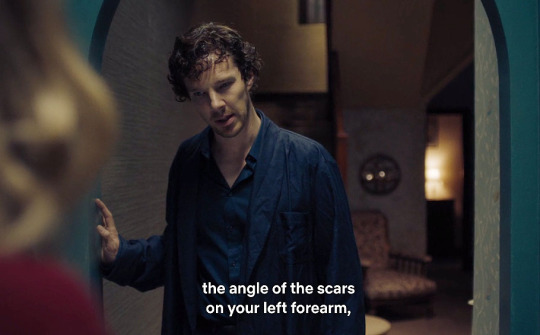


But if ‘Faith’ was actually Euros, what was her purpose of first making Sherlock think she was suicidal and then just disappear? I see it as more likely that this is all about Sherlock processing his own relationship with John. Sherlock might have been sexually frustrated for a long time, because nothing ever happened between them. But at the same time Sherlock wasn’t really in touch with his feelings and basically horrified to ever talk about it with John (greenhouse scene in TAB is testimony). It’s possible that Sherlock had started using again when John had decided to get married (like he did in canon) and had scars of the syringe on his left underarm, but John didn’t notice this, because he wasn’t there. ‘Self-harm’ in this case equals drug use.
3. Nurse Cornish tells John in TLD that Sherlock has ‘made a mess of himself’, when what we actually saw was John assaulting him.
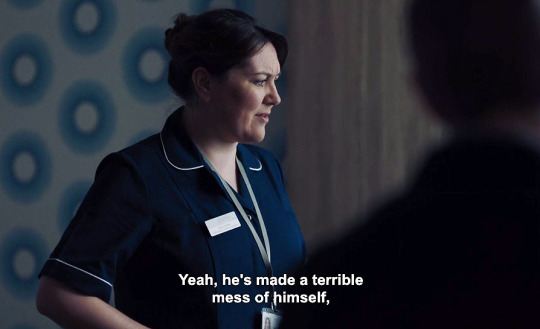
But why would the nurse in charge blame the victim in front of the perpetrator? And why all this glossing over the fact that John Watson attacked and beat up his friend to the point of hospitalizing him? Sounds very much like Sherlock’s guilt to me, like he’s actually processing the consequences of what he’s done to himself (his OD) in his Extended Mind Palace.
It also seems like Sherlock is re-hashing things in his EMP, because we already have a scene from the very first episode, where someone accuses Sherlock of having ‘made a mess’:

4. In TFP we learn that Euros cut herself when she was a kid “to see how my muscles worked”. The parents thought it was a suicide attempt. But little Euros is standing here between them, as if the case was being analyzed in Sherlock’s Mind Palace.
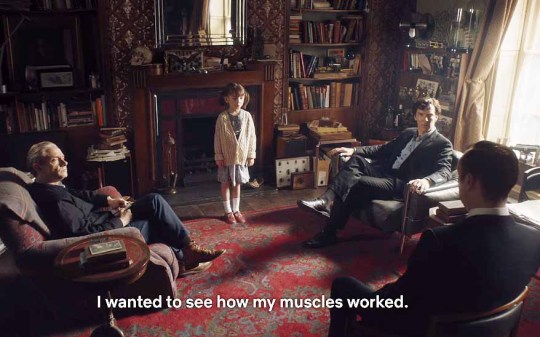
So what if Euros is actually a part of Sherlock himself? If S4 all happens inside Sherlock’s head, this could very well be the case. Which means that Sherlock might have been the one to harm himself as a kid.
5. As I’ve tried to show in this meta, suicide is one of the major themes in this show. It has been referred to or implied so many times, rubbed in so thoroughly, that it’s rather upsetting. This is a very serious topic, and I doubt the show-makers intend to treat it lightly. I’d rather believe they want to catch our attention with it, to contemplate the dire consequences to other people of Sherlock’s OD. Just like I think Sherlock himself does in TLD, when he warns ‘Faith’...
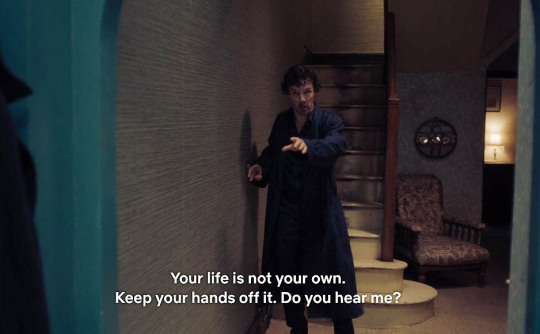
...and throws her gun in the Thames...

...and argues the point:

6. And then there’s ACD canon. Before Holmes ’falls’ with Moriarty in the Reichenbach Fall (The Final Problem) he leaves a note to Watson (= a classic reference to suicide). It’s believed that Doyle’s intention was to let him die and end the story with Watson living an ordinary life with his wife and only nostalgic memories left from his time with Holmes. But the fans protested and insisted for years until ACD ‘resurrected’ Holmes and published new stories. So if ACD almost ‘killed off’ this great character in canon, wouldn’t it be rather canon compliant of Mofftiss to almost do the same thing? One of the canon stories is also named ‘The Dying Detective’, but in BBC Sherlock they’ve changed the name to ‘The Lying Detective’ - maybe in order to not make it too obvious?
7. On a meta level, would there be any reasons for the character of Sherlock Holmes to try to commit suicide? Well, yes; I think there are plenty of hints that there might be. And I believe @tjlcisthenewsexy puts the finger exactly on those reasons in this excellent meta (my bolding): “If a person takes their own life due to depression directly caused by a heterocentric culture and institutionalized homophobia, then is it really suicide? Or is it murder?” I think this issue was raised by Sherlock already in the first episode, albeit in a slightly less obvious way; the victims of the serial killer were persuaded to take their own life when the killer put pressure on them.
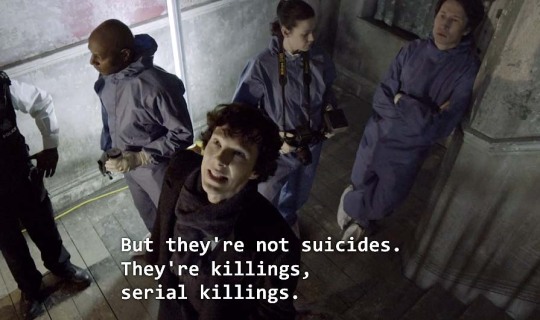
Same thing basically happened in TRF, when Moriarty pressured Sherlock to jump. And in HLV when Lord Smallwood committed suicide after CAM (=Media as a villain) put pressure on him with blackmail. But the real culprit isn’t the victim; it’s society’s norms and attitudes that pressure them. The issue of homophobia isn’t of course openly addressed in BBC Sherlock, but I think it’s heavily implied for us to read between the lines.
Prediction #3: There will be abundant references to Sherlock’s drugs use, since this is the proximate cause of his state and therefore constantly on his mind.

Why do we see an IV drip with morphine in HLV? Well, this is the episode where Sherlock gets shot in the chest, so naturally he needs morphine as painkiller… But wait a minute; wouldn’t his brother have informed the hospital staff of the risks of giving Sherlock morphine, seeing as he’s a drug addict? And then there’s Janine’s comment:

Observations: There are several drug-related things in HLV that don’t really make sense.
Firstly, after knowing him for merely a month, Janine seems to be very much aware of Sherlock’s drug dependence. But if she is already this knowledgeable, why did he have to tell her that he had been ‘working’ when he had actually been sleeping in a drug den (and she seemed to buy it)? But if she didn’t know about the drugs, who had suddenly told her now?
Secondly, for some odd reason, Sherlock’s drug use seems to be a far bigger issue than his shot wound. A gun is used three times in HLV (twice on a human). But there’s a whole bunch of different drug use references, most of which have to do with Sherlock: a) Isaac Whitney, b) Sherlock found in a drug den, c) Sherlock’s blood tested for drugs at Barts, d) Mycroft gathering Sherlock’s ‘fans’ to search 221B for drugs, e) “Don’t appall me when I’m high”, f) IV morphine drip, h) Janine’s comment about drugs being Sherlock’s dream, i) CAM ‘reading’ opium and morphine as pressure points for Sherlock, j) Mrs Hudson ‘running a drug cartel’ and k) Sherlock having Billy drug his whole family. So there are far more references to drug use than to Sherlock almost dying from a gun shot, which is glossed over; no-one seems to really care about his shot wound or chest pain until he falls apart. Mrs Hudson doesn’t seem overly worried when she learns Sherlock has escaped from the hospital. John - his doctor friend - even yells at him to shut up, and threatens to kill him, when he’s supposedly already dying for the second time:
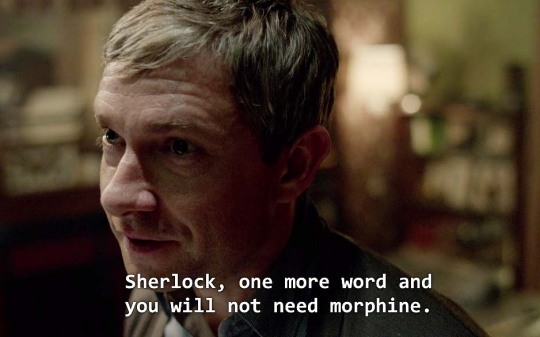
And Sherlock himself starts to talk about ‘surgery’ and the murderer calling the ambulance and other pieces of absurd, illogical nonsense to gloss over the shot wound, which is now threatening his life again. While at the same time claiming that his drug abuse is actually real; he only solves crimes as a substitute for being high...
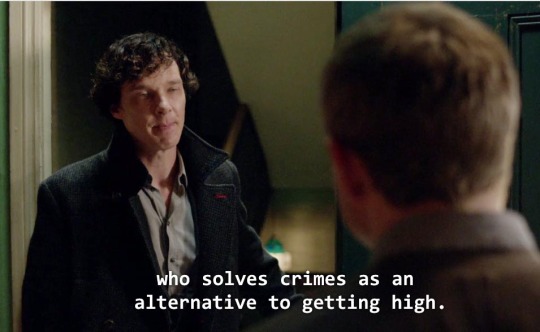
At Christmas in HLV Sherlock’s own parents are fussing more over pregnant ‘Mary’ than over their own shot-wounded son. He’s fresh home from months in hospital but doesn’t even move strangely. In hospital he had only a plaster over the shot wound, no bruising visible. This is not realistic in my opinion; if Sherlock was really shot wounded, he wouldn’t have been able to escape by the hospital window in the first place. How did he manage to bring the wheelchair with him, by the way, complete with attached IV-drip of morphine?

The idea of Sherlock risking his life again; all this mystic, dangerous and elaborated scheme to track down ‘Mary’ and confront her with her crime - and for what? Only to then dismiss the shooting as ‘surgery’ that ‘saved his life’ in order to persuade John to stay with her? It’s just not credible; this is more reminiscent of an action movie (Bond?) derailing into absurdity. I think what all these signs tell us is that Sherlock’s real problem isn’t the supposed shot wound; it’s a drug-related problem.
So, now that we’ve established at least the possibility of Sherlock having OD:d on drugs and ended up in coma as a result, we arrive to the point of determining more precisely when it happened.
Prediction #4: If Sherlock falls into coma, there would be a credibility change/difference between ‘before’ and ‘after’ the OD.
Now this is a hard one, because in BBC Sherlock there’s generally a very subtle line between ‘reality’ and ‘imagination’. There are a series of weird events in the whole show that I find it hard to believe in, and many of them happen before HLV…
Irene’s mystic break-ins into 221B which no-one had noticed (ASiB)
Sherlock being visited by Moriarty at 221B after the trial in TRF, before even John got there
Sherlock having a conversation with Moriarty on the rooftop in TRF (how did Sherlock predict that Jim would have him jump off a rooftop in particular and therefore made his arrangement of faked death based on this?)
Anderson’s sudden metamorphosis into being Sherlock’s fan-club (MHR)
Torture scene in Serbia and Mycroft’s cruel behaviour there (TEH)
Soldiers who don’t feel when they’re being stabbed in the back in TSoT. (This is such a crazy idea, and the given explanation we have is hard to believe)
These things are weird and not very realistic, but at least they might contain a grain of truth somewhere, albeit dramatized. But in HLV and onwards it does get far worse, in my opinion, when people start acting way out of character or doing absurd or outright impossible things. These could be signs that the events from HLV and onwards are fabricated by Sherlock’s brain, rather than representing ‘real’ things that have actually happened.
Out of character As for acting OOC, I think John’s behaviour has some ups and downs in the show, but in HLV he gets abominable to a point of no return; the idea that he would stay together with ‘Mary’ after she shot his best friend is highly unbelievable - pregnancy or not (in fact it’s even less believable that John would find an assassin, who should be in prison and who attempted to kill his friend, fit to raise their child). And the top of the mountain then comes in TLD, when John assaults Sherlock and acts as if it’s all Sherlock’s own fault. No credibility left.
But I’d still say that it’s an even bigger OOC development to have the world’s most famous detective stop solving crimes and start committing them instead.

Because as far as I can see, crime solving ends with TSoT; after that, Sherlock doesn't solve a single crime case that hasn't directly to do with his own private life: • He fails to solve lady Smallwood’s blackmail case, which instead ends with lord Smallwood's suicide.
• He fails to capture CAM, the criminal who caused this; instead he murders him. The famous crime solver is now a criminal instead. • He fails to solve Emilia Ricolettis case in his own mind; the person he thought was guilty turns out to be Moriarty instead - who is supposed to be dead. • He fails to solve the mystery of why Moriarty's ‘Miss me?’ video is on every screen in the country, which was supposedly the reason for bringing him back to London. • He fails to save a single one of the Thatcher busts from destruction and why would he want to do that anyway; he even smashes the last one himself! • He fails to find the stolen Black pearl of the Borgias; instead he finds the AGRA stick from Mary's assassin gang. • In a highly doubtable deduction sequence without any kind of evidence, Sherlock decides that Charlie Wellsborough's death is no crime at all; he just had an unfortunately badly timed “seizure” in an extremely weird situation. • He fails to solve the Norbury case, which would exonerate ‘Mary’ from accusations of treason; instead ‘Mary’ dies in a most incredible and over-dramatized way which is physically impossible. • He tries to prove that Culverton Smith is a serial killer, but the only thing he manages to prove is that Smith can try to kill him, Sherlock, on his own request. Supposedly, Smith 'can't stop confessing' after that, but we never get to see or know any of these confessions. • The rest of the show (TFP) is exclusively about Sherlock's own family problems. The only 'outsider' crime cases he tries to solve - his sister's death threats against Sherrinford's governor with wife and the three Garrideb brothers - are complete failures; they all die. He believes he saves Molly's life by forcing her to confess that she loves him, but Euros tells him there was never any danger. Failure again. This is rather far away from canon, where Holmes kept solving crimes even after retirement, isn’t it?
But in this show, after TSoT, there’s only one thing that the genius detective manages to do right: he saves John Watson from the bottom of a well. By solving a puzzle.
So yes - I think these things show a huge difference in credibility between 'before' and 'after' TSoT; the world's most famous detective has stopped solving crimes! (But what about all the cases that were supposedly solved by Sherlock 'spinning plates' in TST, you might ask? Not to worry, I'll get back to that later ;))
As for HLV, I think this is the episode where things start getting completely out of control for Sherlock, indicating that he is actually no longer conscious. Which would mean he doesn’t experience new events in the show’s reality, but his brain keeps re-hashing memories, combining them in new ways to solve Sherlock’s personal problems. Apart from the OOC arguments explained above, I tried to point out a series of others in this meta, connected to Janine’s character. We haven’t seen much of her, but in HLV she appears to be a person with less than average intelligence, which I think she didn’t in TSoT:
Why would Janine risk her employment to let Sherlock sneak into her boss’ high security office at night when she knew he was there?
Why would Janine believe that Sherlock would propose to her after they had known each other for a month and he had just left her waiting for him the whole night in his flat without knowing where he was?
If Janine and Sherlock haven’t had sex (because of his reluctance), how come she all confidently just gets into the shower with him?
How can Janine miss out on all the mayhem at 221B - a ‘drugs bust’ with several people present, Mycroft being slammed into the wall, Sherlock talking about her boss as a monster, etc.?
Janine just doesn’t behave in a logical manner in HLV. It. Doesn’t. Make.Sense.
Impossible The first outright impossible thing I can spot, is ‘Mary’ getting into CAM’s office faster than Sherlock. Sherlock makes a whole lot of effort explaining to John that the only way to get into CAM’s office is by his private lift, and just how difficult that is.

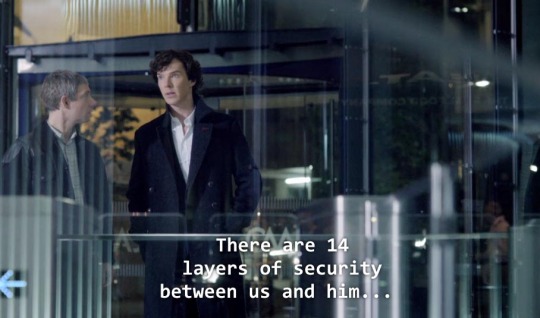
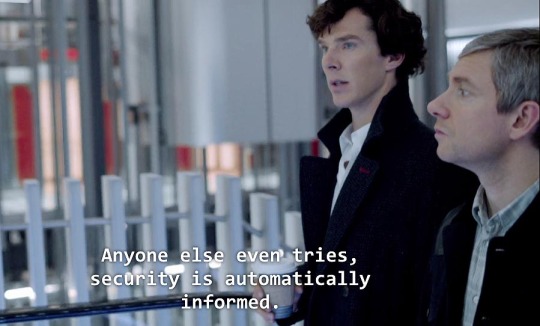
Anyone who tried to climb up wouldn’t just need the agility of a circus artist like the ‘spider’ in TBB; they would have to climb the façade, break into the flat and knock two people down in basically no time. I think we can safely say that it’s physically impossible to climb a building of 32 floors and manage all that in less than 45 seconds (which is the time it takes for Sherlock and John to go up with the lift after Janine has let Sherlock in).
Some people may want to talk about ‘artistic license’ here, and claim that this is just entertainment, this is just the show makers twisting reality a bit to make their show more exciting. But don’t forget the major weakness of this argument: if we excuse one clearly impossible thing with ‘artistic license’, then we must be prepared to excuse all of them the same way. Which means that the whole rational basis of Sherlock Holmes’ own methods in this show becomes invalid, because then there are no deductions to be made, since nature laws and reality as we know it don’t exist ‘in-show’. Which could very well be the case, as I see it, if nothing in this show is meant to make sense - or if there’s still a coherent plot-line somewhere, but the events we do see are mainly taking place inside Sherlock’s head. But my idea here was still to try to pinpoint a change, a difference in levels of weirdness, between ‘before’ and ‘after’ Sherlock’s presumed OD.
Prediction #5: There will be time- and place-references that coincide with a possible OD directly after TSoT
If Sherlock would take to kill himself, where would it happen, when and how?
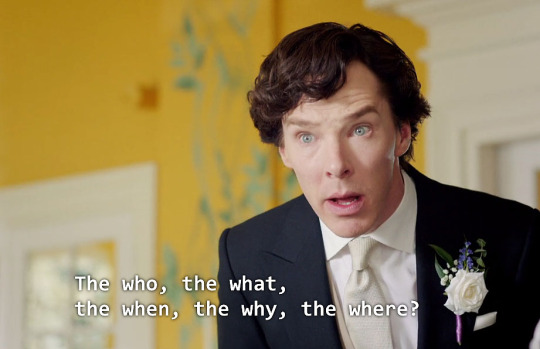
Well, I think Sherlock already explains it to Lestrade in this ‘script’ from ASiP published on BBC’s website, where we get this (supposedly) cut out scene:
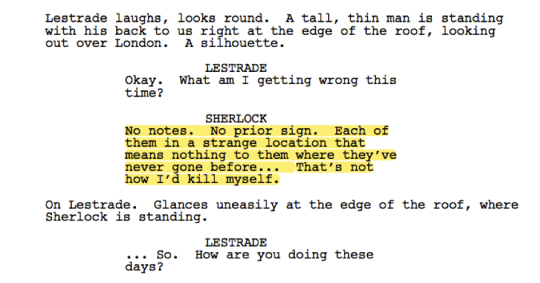
In other words: Sherlock would kill himself, but in a different time and place, presumably a) after leaving a note and b) after some ‘prior sign’s. And c) he’d do it in a familiar place that means something to him. So, to track down the point in time when Sherlock might have done this, we need to determine a) when he has left some kind of note and b) what ‘prior signs’ that could have preceded this.
Observations
Point in time: As for a), in TAB, after realising that Sherlock has OD:d, we learn that he has made a list of all the drugs that he’s taken; a promise to his brother since years ago. That’s a kind of note – isn’t it? A note that could help saving his life after an overdose.
But there are also hints that TAB isn’t the real time of the OD event:
JOHN: He couldn’t have taken all of that in the last five minutes. MYCROFT: He was high before he got on the plane. MARY: He didn’t seem high. MYCROFT: Nobody deceives like an addict.
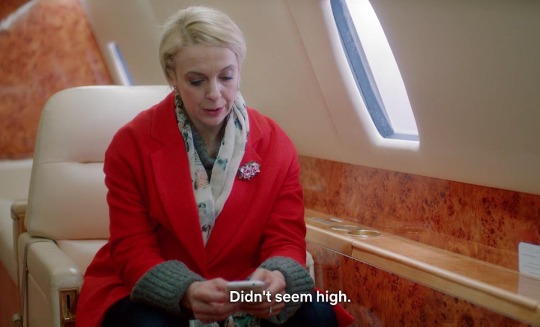
But wait; could Sherlock really have overdosed on drugs and after that performed the whole scene at the tarmac? Where he says goodbye to John, jokes with him and makes a whole little coherent speech about the Game and the East Wind? Not very likely for a person who has OD:d if you ask me…
And then there’s also the fact I pointed out in my last meta (X); that Mycroft talks about this OD coming after a ‘week in solitary confinement’ when Sherlock was locked up with his worst enemy - himself. I think this week could well be the time John was on ‘sex holiday’ after the wedding. If the shooting of CAM wasn’t real (which is supported by the easiness with which Sherlock gets away with murder without any kind of lasting consequence), neither has there been any imprisonment. I can rather imagine Sherlock isolating and locking himself in at 221B for a week, trying to alleviate his pain and heartbreak with drugs after John’s wedding.
Regarding the turn of events after a presumed OD which we don’t actually see, @sagestreet has made a whole reconstruction of how the things could possibly have happened in one of the additions to this meta (please scroll down to the subtitle “TIMELINE FOR A POSSIBLE OD-AFTER-THE-WEDDING SCENARIO”.
There’s also a note playing a central role in TLD, and I’ve tried to elaborate on this in these two metas: (X, X). The episode TLD seems to take place long after John’s wedding, when he already has a daughter. But what if this is actually not the case? What if the whole of TLD just represents Sherlock’s brain going through events that actually happened immediately after the wedding? (Or even immediately after his faked suicide, in some cases)?
Geographic place: The whole sequence in TLD about Sherlock isolating himself in 221B, resorting to an intensive drug abuse that is basically killing him, could be showing what really happened with him directly after the wedding. John has (supposedly) abandoned him (honeymoon?) and he’s turning nuts, talking to himself (Billy Wiggins), shooting the walls and playing out a Shakespeare drama all by himself.

221B would also fit with c), ‘a familiar place that means something’ to Sherlock. The events might in fact be showing some kind of reality, perhaps it’s just the time of them that is twisted and misplaced. Which would seem likely, if this is Sherlock processing his distorted memories of those events inside his still drug-addled brain. On the other hand, the prison where he allegedly would have taken the drugs and got high, before meeting up at the tarmac to board the airplane; none of these places would have the slightest personal meaning to Sherlock, would they? So where exactly is he more likely to take an overdose according to the deleted scene manuscript; in prison or in 221B? I think the answer here is clear.
Prior signs: Regarding b), I’ve already talked about the signs of self-harm in TLD that John doesn’t seem to either notice or acknowledge. The drug abuse is one clear sign of self-harm, but there’s also more subtle things, like Sherlock basically abandoning his job (which he was supposedly ‘married to’) to take over John’s wedding planning; something he would normally find mundane and probably despise. He even tells John’s and Mary’s wedding guests in his speech how utterly useless the ‘wedding tradition’ is. So why does Sherlock even do this? John and Mary would be fully capable of planning their own wedding, wouldn’t they? I think it’s a form of self-harm, self-punishment or maybe even self-imposed martyrdom - “a cross I have to bear” as he tells John, referring to his ‘ordinary’ parents.
The ‘delayed backstabbing’ in TSoT also makes for a dramatic metaphor about what happens to Sherlock; if he’s the un-seen murder victim of this wedding, the effect of it doesn’t play out until afterwards, when he’s left to his own gloomy thoughts and feelings of abandonment in 221B. Which would mean the delayed back-stabbing was a prior sign to Sherlock’s later ‘bleed-out’.

It’s also interesting to speculate about exactly when this actual back-stabbing took place. We never get to see the wedding act in TSoT, but we do see the moment when it dawns upon Sherlock that Mary is pregnant. I think Sherlock’s realization of her pregnancy is the last nail in the coffin; that's what ultimately breaks his heart. It’s not until after this moment that Sherlock leaves the party; a marriage can be dissolved, but a child is a child and it will always be John’s responsibility. Which basically means the definite end of their crime-solving life together...
But I think the most important piece of evidence about the time of Sherlock’s possible suicide attempt taking place immediately after John’s wedding is this:
John’s blog stops updating at this point. The blog also took a pause after TRF, but the current gap is definitely the longest. All this time we’ve had John’s blog as a more ‘sober’ account of the events; a ‘second opinion’, if you like, to what I believe the show is: Sherlock’s more colourful and dramatic tale of their life together. Sherlock hacks the blog and posts one last instalment before the blog dies completely. I believe this last post can be seen as Sherlock’s ‘note’, which I’ve tried to explain in these two metas X , X.
But what about the blog cases of S4? In TST we see a lot of cases listed by John’s supposed blogging; so many in fact that John tells Sherlock that he can’t go on ‘spinning plates’. Yes, it sounds promising, but since a) John is typing on a jpg-file (which is technically impossible, unless you convert it to or integrate it in another format),

and b) there are no references on the real blog to these new ‘cases’, I’d say that none of these cases are realistic. Which probably means they are fabricated by Sherlock’s brain - some of them are even rip-offs from old cases, like The Six Thatchers.
Last but not least: on a meta level, is there a certain significance to TSoT as an episode that makes it a good time reference for being the point after which Sherlock passes to a comatose state? This analysis isn’t mainly intended to reflect a meta level of the show, it rather focuses on the textual level. That doesn’t mean, however, that I find the meta level unimportant. There are quite a few tumblr analysts that have expanded on the form and shape of this show; its ‘messages’, arguments and conclusions on a meta level. For example, @garkgatiss has published several very thorough analyses of the overall pattern of BBC Sherlock as a five-act drama. In the latest one, dedicated to analyzing Bond and Hannibal references, @garkgatiss points out this about the symmetry pattern of S3 (my bolding):
“S3 doesn’t follow the same Bond/Hannibal triad structure as S2 and S4, and we shouldn’t expect it to. Nevertheless, we still find Bond and Hannibal in TEH and HLV — TEH ‘revives’ the myth of Sherlock Holmes that was destroyed in TRF when Sherlock returns from being dead and proves he was not a fraud after all, and HLV gives Sherlock the Clarice Starling creation myth, as befits the true hero of the story. TSOT, as the overall midpoint of the show, serves its own distinct function in the story that I plan to cover in full at some point, but not here”.
So, TSoT represents the midpoint of the story. It’s also the point after which, I believe, Sherlock enters his comatose state and resorts to pure speculation about the future. Or, should I rather say, he resorts to modeling the emotionally devastating consequences of his own choices, in a series of worst-case scenarios, which are basically S4, but start already in HLV. Which would mean yet another indication of the story arc being symmetric, with the figurative ‘murder case’ in the middle; Sherlock’s heart breaks when John not only marries ‘Mary Morstan’, but even starts a family with her. Because Sherlock’s discovery in TSoT of ‘Mary’s pregnancy will (in Sherlock’s mind) most certainly mean that John’s days as a companion to Sherlock’s crime solving are counted. A responsible father wouldn’t run around risking his life on a daily basis, would he? So yes - to me TSoT undoubtedly marks a midpoint in this story.
So, to sum it up once again: my belief is that this show is totally happening within Sherlock’s head, from his PoV. But there’s a distinction between what happens before TSoT and after; in the former case Sherlock voluntarily goes through his memories with John, based on reading his blog. In the latter, I think Sherlock’s body is in coma due to an OD, but his mind is racing, thus the extra weirdness.

Summary
In brief, I think Sherlock Holmes has some serious stuff that he needs to deal with, and so has John Watson, even if maybe Sherlock’s issues are the worst. And in S4 Shelock does; he goes from being someone who constantly tries to detach his brain from its inconvenient ‘transport’ of a body, to someone who ultimately allows himself to care deeply and truly. And I believe that’s basically what this show is about: the long and winding road to freedom, the mental journey home to 221B. And on this inner journey, he has to go through hell, which means pain, heartbreak and loss, but also insight and realization. But since this is also the story of a truly brilliant and remarkable human being and his only ’feature of interest’; an extremely competent, brave and loyal person, there’s good hope that they can actually help each other. They just need to overcome their worst adversaries first; their own internalized heteronormativity and homophobia, imposed on them by society.
I think one of the most interesting things with Sherlock’s process is to see that it’s actually his brain that saves him. While Sherlock’s intense emotions lead him to desperate actions that cause a comatose state in his body, his brain still refuses to give up, because it needs to understand. Which - seemingly paradoxically - leads him to seek contact with his own feelings and thereby solve the problem - the final problem. This character development is indeed extraordinary.
Phew! I’m truly grateful for those of you who might have managed to read through these two monster posts. :) The next installment of this meta series - which will hopefully be a bit shorter - will handle Hypothesis #5: Almost everything we see happen in HLV, TAB and S4 is Sherlock ‘running scenarios’ in his mind, based on a mix of his earlier memories and movies he has watched.
Tagging some people who might be interested: @raggedyblue @ebaeschnbliah @sarahthecoat @gosherlocked @fellshish @sagestreet @tendergingergirl @loveismyrevolution @sherlockshadow @darlingtonsubstitution @tjlcisthenewsexy @devoursjohnlock @kateis-cakeis @csi-baker-street-babes @sectoralheterochromiairidum @mrskolesouniverse
134 notes
·
View notes
Note
Hey SA I've just seen you reblogged a post about goodbyes in the show and I so would like to know your opnion on this. Do you think the cane scene was in character for John? Tbh I think his character was very OOC in S4 but I'd like to know your opinion on this. Yours are the only fanfic I read post-s4 I really trust you with my heart. Thank you!
Okay, just as a disclaimer, because I really, really don’t want anyone to think the opposite here, I absolutely love John Watson. Please don’t be confused about that. That said, he’s got some massive issues.
Unfortunately, I do see the cane scene as in character, but I’m also one of those annoying people that would say that there’s a huge range of what could be considered “in character” for every human, you know? I’m just as much myself when I’m being a total dick as when I’m being the best version of myself. One end of the spectrum is not truer than the other. John is just as much John when he’s doing that soft, gentle, tender gaze, like at Sherlock and Mrs Hudson in ASIB as he is when he’s physically hurting Sherlock. Unfortunately, they chose to draw out the ugliest aspects of John’s personality in series 4, showcasing his damage far more than his heroism and the beautiful soul that he also is underneath those trust issues and unspent, ultimately inward-pointing anger and guilt and sense of inadequacy. Walking out when things get difficult is very much consistent with his behaviour from series 1 forward: look at his little domestic with Sherlock in TGG: Sherlock is being insulting and difficult, and instead of trying to talk through it or ask deeper questions, or even just argue it out, John gets up and leaves.
I would say that it’s canon that he also left Mary after she shot Sherlock. I don’t see how anyone could possibly have maintained “months of silence” while occupying the same space. It just isn’t possible. For a few weeks, maybe, but months of genuine silence? No way. John wasn’t there. To his credit, and this is a big thing, John doesn’t stay mad. His capacity to handle things blowing up in his face is rather limited, but give him time and he’ll go back and give it another go. It took him 24 hours after Sherlock returned. Even when he thought the bearded old man was Sherlock playing a prank, he was laughing in spite of himself and clearly, overtly disappointed when it turned out not to be Sherlock. So he went back. The fact that it took him six months to return to Mary says a lot in terms of how reluctant he was to do it. I hate that he did it, but I get that the weight of his sworn word and the impending arrival of his child were the sole driving factors there, rather than love for Mary herself. His extreme reluctance and over promise of continuing anger during that scene hardly made for a cozy little reunion scene (I once saw an interview where Gatiss referred to it as “so tender and moving” or some crap like that, but that’s a rage post for another day!). The point is, given time to sort himself out, John goes back. He goes back to therapy even when he thinks it isn’t working. For all that Mrs Hudson had to bully him into it (he wasn’t ready and that wasn’t right!), John did finally agree to see and treat Sherlock. He would have gone back. That’s as much in his character as his preponderance for leaving is.
Furthermore, while it’s ugly that he leaves, I also find it entirely understandable. This is someone who has a history of familial issues, estranged from everyone except a sister, with whom he shares a barely-tolerated relationship. He was in an active war zone: say no more. His superior officer, on whom he clearly had at least a bit of a hero complex for (and I personally don’t see anything else there, but that’s also plenty!), let him down and shut him out. Life had already betrayed John over and over and over again by the point that he met Sherlock. And Sherlock, for all of his intellectual brilliance, had never allowed himself to have a relationship so close that he might actually want to consider the other person’s feelings. He was clumsy and a slow learner and I think it took him a long time to see that John’s feelings needed better care than he was equipped to understand or give at the time. Their shared sense of inappropriate humour always had that edge to it, and while John is mentally healthy, I think he loves it (and I think that that’s why, when Sherlock faltered in the restaurant upon seeing John again and hastily revised his ill-conceived plan, that he turned to the one thing he thought he could rely on, this shared humour) but when he’s having one of his bad times, it cuts sharply. I think that he understands the genuine affection behind it, and when Sherlock said everything he said in his wedding speech, I think he was honestly shocked to hear it expressed so directly. He does know how much Sherlock thinks of him, how much he relies on him, and that any light jokes to the contrary are genuinely jokes. With Mary, on the other hand, they weren’t actually jokes and he knew it. They’ve always had communication problems, ones that lead to living out what they want from each other in the worst ways possible, but the love behind it is a real thing. Their actions only hurt each other so badly because of that very yearning there, one that neither of them seems able to express, or willing to take the risk to express. It’s a truly damaged relationship and they’ve both been damaged by it. As someone who absolutely believes in their love, and in the capacity for them to love hugely, deeply, and without reserve, it hurts to say that. Nevertheless, I do believe that with all of my being.
I’ve joked that my new “kink” since series 4 is getting them both some therapy. I’ve written more therapy in stories since Christmas than ever before! Since series 4 started airing, I’ve written These Four Walls & Exile (after TST), Where My Demons Hide (John goes back to Ella), Now That the Dust Has Settled (We Can See the Stars), and A Satellite Out of Orbit (told from Ella’s POV in which she sees Sherlock during TLD), (after TLD), and then after TFP: A Case for Domestic Propinquity, Hell Hath No Fury (John goes back to Ella), From the Bottom of the Well (John goes back to Ella), Bridging the Ravine & Set in Stone (which take place at a resort for same-sex couples needing group and one-on-one relationship counselling). I think they need help. I also think that one of them could finally come to his senses and realise one day that they need to talk, and talk properly. I take back what I said about my biggest canon frustration being the way John leaves Sherlock: it’s definitely Moftiss never having once allowed them to have a direct, honest, and complete conversation. (Sometimes direct, sometimes honest, but never complete!) I think that they could get there on their own. It’s possible. It just hasn’t happened yet.
That said, remember this: in opera we always say that the opera never takes place on the day that nothing happened. Remember all of those other days we aren’t shown: we can safely assume that alllll of those other days, and these are the majority by far, they lived together, cooking and taking out the trash and taking turns in the bathroom (that model of house would rarely have had a third bathroom on the third storey; that’s where the servants would have lived and they’d have used an outdoor privy at the time when this model of house was built, and the other bathroom would be in Mrs Hudson’s suite). They’d have taken cases and gone for midnight dinners at the Chinese restaurant on the corner and laughed at all of the wrong times and provoked speculation from anyone and everyone who ever saw them together. They’d have complained about their respective siblings and been a little nicer to each other every time one or the other was having a bad day. Think of Sherlock buying John beer after things with Sarah ended, according to John’s blog. Think of John, on his honeymoon, yet unable to just stop communicating regularly with Sherlock. They’re a damaged team, but nonetheless a team. Think of Sherlock knowing John so well that he could even predict that John would choose to leave him again, and how. They know each other in ways that no one else ever will, and I stand by that.
I hope that helps? :)
#sherlock#john watson#johnlock#they're so damaged but there's still hope#unrepentant shipper here#lilbeelocked
60 notes
·
View notes
Photo

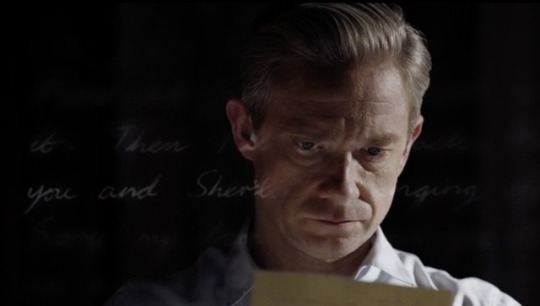
The Film “Stay” and How it Brings Things in Sherlock Together
Right after TFP aired, I did this short meta about how the deaths and accidents in Sherrinford looked staged, and by that I mean they had too little blood, angles were wrong, etc. I was annoyed, because I started off the episode aware that Eurus’s eyes were the wrong color; not the contact lens issue, I mean the little actress playing Eurus had brown eyes while adult Eurus was revealed to have blue, which didn’t make sense. Unless something else was wrong, like little Eurus suddenly appearing in 221B, and the trio suddenly appearing on the beach (as mentioned in TLD), outside the old Holmes residence.
In March, I was working on meta about repeating events, and how to work through things or stage them to look a certain way. It narrowed down to the editing, lighting, and directing choices--throwing in many film, tv, and lit references, in order to create possibly two seasons of content. I say possibly, because I watched S4, hoping it would explain things that still made no sense in S3 (wrong dates, Sherlock taking over the blog, and repeating things off the blog). It just got stranger in S4, and I still don’t know if we’re going to end up back in the aftermath of TRF or HLV. I will say though, that if you follow the plot, flickering lights, disappearing people and objects, staging, camera, and directing choices in Stay, S4 of Sherlock will make a lot more sense. I didn’t know that many people when I did my original meta, and wasn’t aware people hadn’t seen Stay. I was glad it seemed to help a few people.
The image at the top if from the film Stay. It says Forgive Me over and over again, because Henry (Sherlock) not THoB Henry Knight, but that works too, because he also lost his parents in a traumatic event, writes it about his guilt over those deaths. Henry Knight was also a Sherlock mirror, and it’s possible that it was his parents that died in a traumatic way (based on evidence in TEH that I’ve already covered), causing the rift between Sherlock and Mycroft (or possibly their father having an affair). Henry’s been suicidal for quite some time, and the whole of Stay revolves around his traumatized brain trying to make sense of things in his last minutes alive. Compare that with the note John receives, because some of us contemplated that it was actually meant to represent the note Sherlock didn’t leave in TRF. “Ordinary” is also what John says about Sherlock’s parents in TEH, and it’s the word Mary uses about having a life with John.
Note the line from Stay about suicide. Naomi Watts’ character is speaking to Sam (John), a plaid-and jumper wearing, bicycle-riding therapist who was standing in for Henry’s regular therapist or so it appears. She’s tried suicide before, and she’s quoting Henry’s favorite artist, who also took his own life. It’s important to note that Lila tells Sam (John) he can’t understand being in the kind of pain that she knew, and that Henry seems to be experiencing. It’s the same sort of idea that many of us have had about how John treats Sherlock in S3 and 4, without having been in his shoes. Lila does mention how there is too much beauty in the world to end things, though...
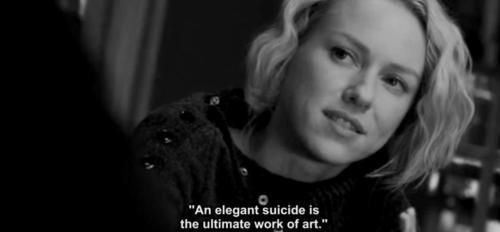
Compare this with Sherlock in TLD, speaking from his own experience with taking his life in TRF.
(Part of this is a direct quote from ACD canon The Veiled Lodger--)
Sherlock: Your life is not your own. Keep your hands off it, do you hear me?
Sherlock: “Taking your own life.” Interesting expression. Taking it from who? Oh, once it’s over, it’s not you who’ll miss it. (Resting one hand on the railing, he looks westwards along the river towards the London Aquarium. In a brief cut-away, a pistol fires towards the camera, then there’s a brief shot of the exterior of the Aquarium as the gunshot echoes and then smoke rises from the end of the pistol. Sherlock now has both hands on the railing as he continues to gaze along the river.) Sherlock: Your own death is something that happens to everybody else. (Faith has looked in the direction he’s looking but now turns to face him again. He lowers his head, his back to her.) Sherlock: Your life is not your own. (His voice becomes strained.) Keep your hands off it. (As he looks down, it’s as if he and the railing are suspended in mid-air with no ground or river below them. His feet are not touching anything.) ( x )
This is important, because all the events that actually happened in Stay, take place on the Brooklyn Bridge.
Henry is in hell. Sherlock: I’m burning up. (See more below). Mary: Sherlock, go to hell. Mycroft: I can give you a map reference for hell. ER number 999 becomes 666.

We also have The Burning Child (a story told by Freud, who was brought up in TAB and all of S4), which is told by Henry’s father. It’s repeated, just like The Merchant story is in S4 of Sherlock. In Henry’s case, the father is manifesting as blind, because he possibly never took notice of his son or his art. Remember the idea that was going around for awhile that John had been shot in the eye, and was blind? It’s also why I sometimes refer to people (esp Mary in S4) as manifestations, thoughtforms or compilations of various people.
It goes with this, where characters Athena and Lila are morphing, because Henry’s mind is becoming more and more unstable.

This is what Athena actually looks like, and she’s practicing Hamlet (Henry Letham anagram--we know Mycroft loves those), a play about contemplating death.
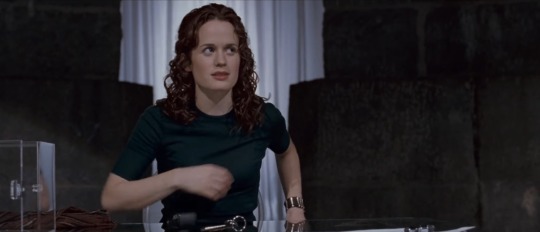
Here’s our Athena/Anthea, who is associated with marriage.
This is in Magnussen’s MP (which also looks like Mycroft’s theatre).
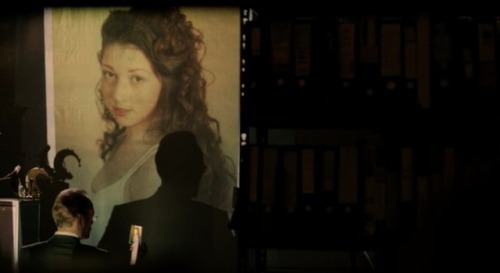
The number 21 comes up four times in this film, because that’s how old Henry was going to be when he committed suicide, but he fell in love with Athena. In one instance, it looks like 2121. 221B anyone?
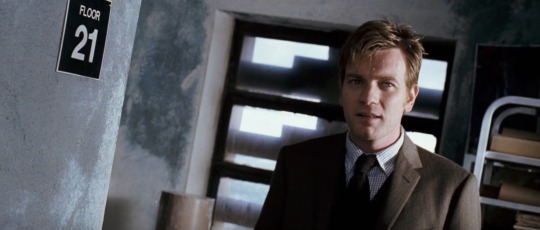
The original meta I did associated with Stay. The rest of these images will make more sense if you view it, but I didn’t want to make this meta too long.
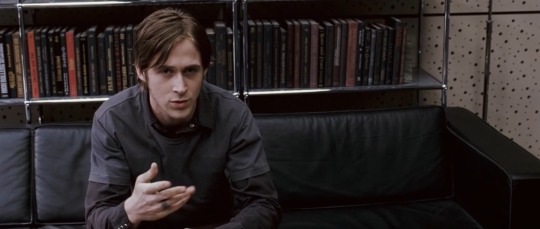
Henry in Sam’s office. Yes, the couch and bookshelf look like Sherlock’s chair.
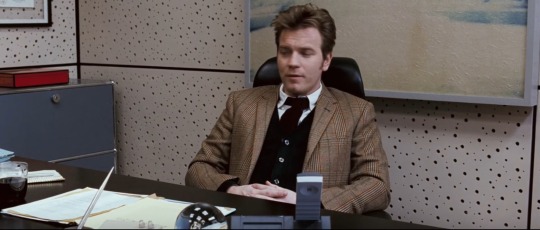
The glass sphere theme, like the one Arwel bought for S4.
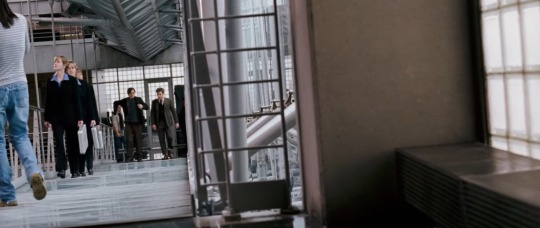
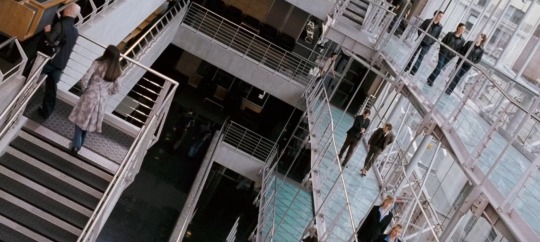
Twins and triplets everywhere.

Leon, Henry’s dad, and Sam playing chess. Sam also has giant chess pieces on his office desk.
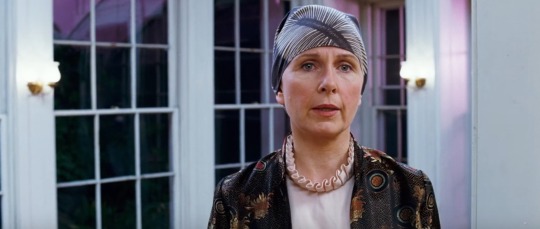
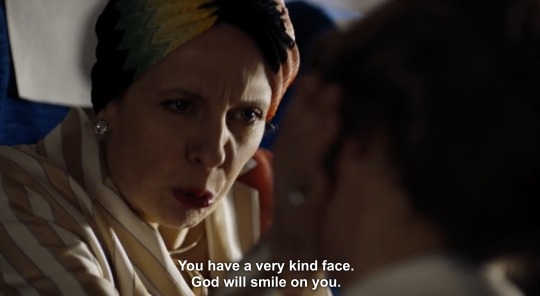
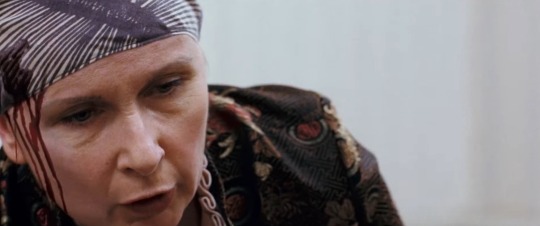
Henry’s mother and Mary in T6T. Henry’s mom and Henry both have this bleeding head issue, because Henry hit his head during the car wreck. The injury is very much like the one when Sherlock goes off the roof in TRF, which is another reason why I can’t definitively say that things started getting weird in HLV.
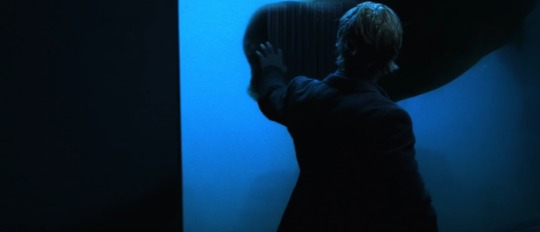
The aquarium (although that is also from The Lady of Shanghai, as are the multiple mirror reflections in HLV)

Stairs like in Magnussen’s place.

Olive, Henry’s dog who was put down years ago, just like Redbeard was.

Empty fridge, like Mycroft’s.
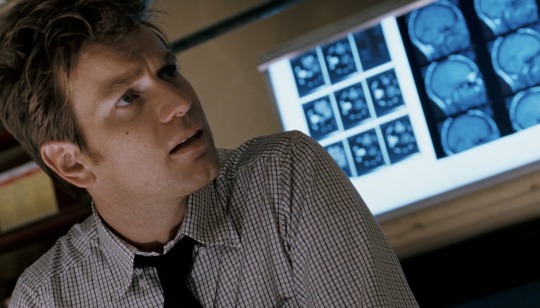
MRI scans in a not-quite medical facility, similar to in Sherrinford.
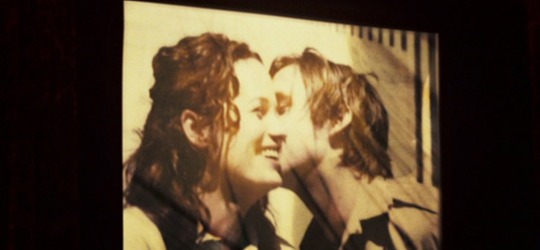
When Henry visits a strip club, these scenes begin to show up on the screen behind the dancer, although the burning effect that happens when Mycroft watches his film is also referencing the film “Sinister”.
I’m going to end this here, because you really should watch Stay for yourselves. This link will bring you to it on YouTube. I’m working on two other meta for Naomi Watts films that factor into Sherlock, but you should also read
@may-shepard The Ring meta, because it’s amazing, and a second one by
@swimmingfeelsinajohnlockianpool that filled in some more information. I’ll be interested to see if we end up with a seven days scenario, since weeks = years.
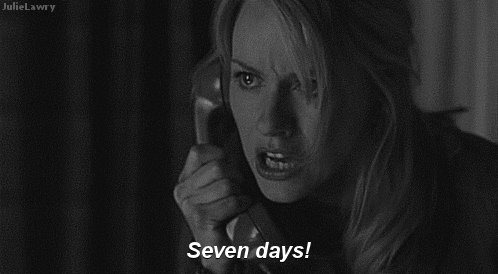
More links and tags under the cut...
Lit, Film, and TV References Master Post: ( x )
*EMP/Unreliable Narrator/Alibi/Editing All Give Sherlock His Audience ( x ) (Part II of Justifying John Watson)
Justifying John Watson/Johnlock as a Player in the Drama ( x )
Time Is a Leveller & We Get Six Napoleons ( x )
*Magnussen’s MP is Mycroft’s Home Theatre ( x )
A Happy Ending or Mycroft Has Been An Idiot ( x )
Lestrade Has Been Helping All Along (Whether He Knows It or Not) ( x )
Sherlock and John Become a Unit/Couple in TLD (Or it’s their memory of doing so—TD12?) (x)
*Stories Making TEH Unreliable ( x )
More Internal Editing in S4 ( x )
In T6T, Sherlock Becomes Left-Handed and John Becomes Right-Handed, But Only When Lestrade is Present ( x )
Ajay in a Memory of Nuclear Codes ( x )
Sherlock and John Became a Couple in TLD ( x ) Part I
Sherlock Became Captain Watson’s Soldier in S4 ( x ) Part II
Stag Night Results in Culverton’s Hospital and the Morgue Scene ( x )
Eurus in Mycroft’s Home Movie Transition ( x )
@monikakrasnorada @mrskolesouniverse @ebaeschnbliah @gosherlocked @devoursjohnlock @sarahthecoat @loveismyrevolution @kateis-cakeis @holmesianscholar @sherlockshadow @tendergingergirl @sherlockians-get-bored @posh-boy-clever-boy @princesse-des-lucioles @fellshish @iris-wallpaper @antisocial-otaku @love-in-mind-palace @darlingtonsubstitution
209 notes
·
View notes
Text
A Very Long Game Indeed
Or: Why “the game” really might be over soon
Can you actually believe the BBC at the moment? Like??? They write a summary for TFP, being all super mysterious, "SOMEONE has been playing a very long game indeed", and then imagine the thought process that followed this genius line… (x)

"What picture could we possibly put in that article... I mean, we write about Sherlock and John facing their greatest challenge ever, so we could use a picture of them being all action-y, or for click-bait reasons we could put a picture of Moriarty or even Mary there, but nah...

"Let's put up a picture of Mycroft, just below a headline that says “The Final Problem”. It's not like we really mention him in the summary... like, it’s implied by the “someone”, but shhh, that's a secret, don't tell the audience… yet."
Below the cut some ramblings on Mycroft in S4, and especially in TST – just because this was a very beautiful journey of Mycroft’s facial expressions.
Moftiss are slowly beginning to show their hand there…
NOTE, 17.05.2017: This post has been written directly after TST aired. I’ll update my theory according to everything that happened in TLD and TFP shortly, because I have a couple of things to say... (just took me a while to get used to this... whatever this series was) - I’ll put the links here under the “Read More” as soon as I’ve finished those posts!
In the meantime, please do enjoy the post in its current version!
At the beginning of the episode Sherlock gets off the hook regarding the murder of Magnussen, because, Moriarty is back, and Sherlock is the only one who can deal with this problem; so it’s a lot more useful to have him here, fighting the dragons, instead of sending him to a suicide mission in Eastern Europe as a punishment for shooting someone’s brains out.
However, those brains had belonged to someone who was in a way quite “famous”, so in order to avoid too many questions, let’s tweak some video footage, shall we? Much more convenient than going through all the trouble of issuing an official pardon.

"Anything some baddie like James Moriarty can do, we can do better"?

I bet someone knows the record keeper...
But joking aside, it’s kind of disturbing, isn’t it? That your own government is not only able to, but also willing to use the same methods that those bad bad criminals use, and this furthermore not in order to keep the people save, but to cover up, not a peccadillo, but a case of cold-blooded murder? A murder which happened in front of a dozen witnesses? And then they blame it on some random NPC, “some over-eager squaddie with an itchy trigger finger”, because it serves the greater good more when this genius detective / murderer is hunting down a ghost?
That doesn’t make me, a random NPC, feel very safe; you?
Anyway, Sherlock is now back on terra firma, #ohwhatabeautifulmorning, and what a beautiful morning indeed, because “the game” is on again.
“The game”, what “game” ...
The... Great Game?

The missing last pip had been haunting Sherlock even inside his gay fever dream (x), so of course this is what Moriarty is doing. The game never had been finished, and now Moriarty’s #back, and of course he’s got something lined up.
Moriarty never had been “ordinary”. He wouldn’t just try to frighten Sherlock, no, no, he would never be that disappointing. He's planned something, something long-term. Something that would take effect if he never made it off that rooftop alive. Posthumous revenge.
No, better than that - posthumous game.

Okay, what the hell is ^this face?
No, honestly. They could have shown any random face here, a frown on Lady Smallwood’s forehead, the disbelief on Sir Edwin’s face, a baffled Mrs Norbury, they could have actually focussed on the person who is currently speaking for all that I know, but no…
When Sherlock starts to obsess about Moriarty and “the game”, and basically any other time Moriarty is mentioned in this scene, Moftiss decided to focus on Mycroft’s face.
A lot.


What is that look on your face, sir?
Is that guilt? Fear? The realisation that you might have gone too far? That your own brother is getting himself in grave danger, and that there is nothing you can do, and even worse, that it is you who is responsible for this?
Let's do a quick recap, because so far, we really don't have any new evidence in that Moriarty case. Lady Smallwood points it out herself, we only have Sherlock's word, Sherlock says that Moriarty is back, Sherlock says that something is going to happen, and that he himself is the target, and furthermore that he is the only person able to deal with this.
But then, in the following months, nothing happens. The only thing that happens is Sherlock trying to be clever, he will know when Moriarty makes his move. And then ends up stumbling across a random, quite unrelated case of the Thatcher busts because of a "premonition", and I can tell you exactly why that was - repeating what I said last week:
Because, this has to be Moriarty - tut tut, he’s repeating himself.
In TGG, Moriarty decided to stage his crimes according to the blog entry “A Study in Pink”.
In TST, Sherlock will think that Moriarty just moved on to another blog entry, “The Six Thatchers” (x), and therefore that this case is related to Moriarty’s return - which, very likely, it won’t even be! It’s enough that Sherlock thinks they are related, so he’ll investigate away, and therefore will miss other stuff that will prove to be terribly important.
(x)
Sherlock has lost himself in playing this game. He's blind to see what really has been going on for quite a while now. Even if he's been stumbling around the fringes of it for ages…
Sherlock knows that the government or respective secret services have the skill to do exactly what Moriarty's been doing all the time; even we, the audience, know that, just look at all the stuff Mycroft is doing whenever he was going all Orwell around John (x)!
Sherlock knows that Mycroft is working for his own and apparently even other governments (implied), offering his services to whoever's needing them, he now learns that Mycroft has been using freelancers like A.G.R.A. - even if Mycroft doesn't tell him that it was him who "wound them up", only that it was his "initiative" to stop using them, what an euphemism! - and isn't it very remarkable that the government seems to have exhaustive records of Moriarty's involvement in all the crimes committed by him at the very least during the last year of his life?

If they have all ^this knowledge and all the aforementioned skills, why was no one able to stop this man? Why did Sherlock Holmes have to fake his death only to then not succeed in stopping Moriarty from carrying out some weird posthumous game - years later (!) - something that threatens public security but apparently is only aimed at Sherlock? He is the target!?
And Moriarty chose the very moment Sherlock was being sent away to his death for his comeback because... why exactly?
In this whole episode, which was meant to explain how Moriarty can be back and what he is going to do next, we didn't see very much of him, or of cases that could be linked back to him. What we do have, apart from the whole Mary arc, is Sherlock obsessing over a ghost, and some Bond-esque spy drama that doesn't paint the government in a very good light.
They are unable to stop the most dangerous criminal the world has ever seen (even worse, apparently they have to rely on an "amateur" for this), and furthermore they are involved in a lot of very shady activities - hiring freelance killers to “save” hostages, doctoring security footage to cover up a murder…
And in the very centre of this, Mycroft Holmes. The most dangerous man we've ever met - and not Sherlock's problem right now.
But he will be. Soon enough.

Mark did promise us "a lot more Mycroft" in S4, after all. (x)
Read more about how Mycroft invented "Moriarty", Sherlock's nemesis, in my MYKEY-Code meta series (x).
@mollydobby, @jenna221b, @missmuffin221, @johnnlocked, @victorianlovers, @studyinpink, @wellthengameover, @just-sort-of-happened, @isitandwonder, @inevitably-johnlocked, @johnlockedness, @cupidford, @hudders-and-hiddles, @heimishtheidealhusband @loudest-subtext-in-tv, @skulls-and-tea, @finalproblem, @miadifferent, @sussexbound, @vanetti, @sherlock-addict, @thepineapplering @ebaeschnbliah @tjlcisthenewsexy, @femmelocked, @mylastvow, @multifandom-madnesss, @quietlyprim @the-7-percent-solution
#crack the final case#Sherlock#Sherlock meta#TST#TFP#MyH#JM#Mykey#meductions#that looks like a case of#intern Kevin
198 notes
·
View notes
Text
Reaction to Sherlock Fandom Reaction
Honestly, okay, I get it. I’ve been a fan since Series 1 and have patiently waited for the following the following seasons. I’ve converted people into the Sherlock fandom, written Johnlock fanfictions, made fanvideos, and well, bottomline–I’ve done enough to prove loyalty to this fandom.
It surprises me to see so many issue arise from this last season. And honestly, beyond the loopholes that I’m sure some of you have practically made a thesis out of, it was a good season for me.
So going to the issue, do the creators really deserve such hate? I understand the disappointment Series 4 brought to most. Truly. But can’t we all, as dedicated fans, do this in a more reasonable way instead of throwing a tantrum against every “flaw” every episode has? We have better ways of self-expression. And being offended by a tweet from sue just because she debunked the “fourth episode theory”, saying as to how she is mean doesn’t really cut it. After all the rude criticism and sometimes irrational hate posts this season has gotten from the fans, do we really deserve another episode just to burn it down?
The following are my opinions upon the matter:
Johnlock: Yes, the ship didn’t sail, hearts were broken, time were wasted watching and waiting for the ust to finally be resolved–but this ship? This ship was not meant to happen. Sherlock and John have a relationship that transcends friendship and beyond any type of label anyone could say. And that’s what makes them special. Caging them, this wonderful duo, into a clichéd romance is not the solution to a better series. It could limit the potential of this series. Well, ffn could say otherwise, but that’s it, ffn remain a fan’s fiction. Johnlock was never promised, love comes in all sorts. Implied love was what they always had, they never called upon it, everyone knows this. So why are some fans still so adamant on it being called onto the series when it’s already undeniably there?
OOC: Alright, honestly, this is one of the best seasons to appreciate John, Sherlock and Mary’s dynamic characterization. It makes them more three dimensional. We’ve always seen them as people, stuck in a specific set of case-based characters. But in a certain perspective, the change means well.
John, as many have sincerely been disappointed in his sudden change of character in TST (I, too, was disappointed), where his infamous loyal self has suddenly gave into temptation of cheating. But well, TDL responded well in that case. But just to point out, Dr. Watson did have a history of being quite a ladies man. His inability to say no is something that can also lead him astray, which probably why he said yes to responding to Eurus. He longs for a life of excitement, he searches for it. No typical man would say “yes” to living with Sherlock Holmes, why would it be so far fetched for him to say “Yes” to something that, in a certain level, is just as thrilling? Also, It’s no shock on how he became such a dick towards Mary’s death, he married her for goodness sake. And he cheated on her. Grief, guilt, anger, inner turmoil and confusion leave him messed up. Sherlock was there, and he never really did like sherlock all the time, there were days when John himself could definitely not stand his flatmate’s eccentricities and obnoxiousness. And adding that to the dilemma and having someone to blame at that moment, Sherlock was his safest bet. But then TLD happened and well, you see John in Mary form. And see that he is still “trying”, that he knows. Without Mary and all the shit that happened, there would be no heart-wrenching scene as that. It is what it is, guys.
Mary, oh and how I have loved Mary in this season because we get to unravel her more. Mary Morstan has been a character I never truly liked until series 4, she was someone I claimed to have stolen John away from Sherlock, someone who lied to John, and hurt Sherlock. She has a long list of reasons to be on our blacklist yes, but she has just as much to be on our good as well. She loves John. She loves Sherlock. She gives way for John to be with Sherlock. She never allows the duo to be in harms way without going through her (literally and figuratively). Sherlock himself has taken a liking on her. Mary seems to be constructed in a way that she fits effortlessly with Sherlock and John and not between them. I mean seriously, she makes effort and she trusts John with everything. She’s exposed to so many bad but she just wants that ordinary life, she wants to leave her past behind and that stupid USB. But some things just don’t work out, especially with a history such as that. She leaves videos with questionable goals, but it worked out for the best in not the best way though. But if any of you thought how John, stubborn and determined army doctor John, would end up hugging Sherlock (minus Johnlock please) and going back to the dynamic duo that they are, I’d be happy to hear them out (plus those would be amazing plotlines for your own ffn). And certainly, the value of her life now lies in Sherlock’s hands, and well it remains to be a currency Sherlock still does not know how to spend.
Sherlock, constant exposure to John, surely becomes more human. His thoughts are more attuned as his moral compass constantly, prior John’s married life and even beyond that, have always pointed Sherlock in the right dimension. And maybe, his sudden deflation in intellect and skills of deduction is ultimately a surprise to me as well. So yes, Sherlock was very human in TFP and have been uncannily haphazard with his deductions in all the three episodes of S4. There were poorly written areas which led to plot holes I cannot deny. There is a sloping criteria in context of the plots and certain discrete yet relevant details. Or the first few episodes were just an exaggeration of what he could do to give the viewers a gist of what he does–meaning, all this time Sherlock had limits of what he could do. And going through the seasons, the appeal of his deductions died down because it’s something usual and no longer spectacular as it seemed to be. That now, we realize, even Sherlock makes mistakes in his deductions. After all, Mycroft was always better and with Eurus in the picture, well, it’s no wonder Sherlock would be the black sheep who took in friends.
Other issues will remain brewing in my head for an indefinite amount of time. If there’s anything you wish to debate about, argue, agree, disagree, feel free to message me or reblog or whatever you wish to do.
I am open to your responses. Thank you.
Sincerely, the-science-of-deduction
P.S. Sherlock wears no wedding ring in TFP as he hands over Rosie to John.
11 notes
·
View notes
Text
Something Funky: Trying to Make Sense of Sherlock Series 4
Did BBC Sherlock jump the shark? Why does it feel that a show that has been in production since 2010 with 2-3 years between seasons (which would provide plenty of time for development) has suddenly taken a nose dive when it comes to the story, writing, character, cinematography, in-universe logic, and overall direction? Why are so many of the community left disappointed in how S4 seems to have ended? Were the fans, theorists, and shippers of TJLC just plain wrong in how they saw the story progression despite the overall tone of S1-S3? Did the writers actually pull the rug from TJLC theorists because, in fact, there was no real rug to begin with? Well, to tell you frankly; I'm not sure about anything. I'm just trying to make sense of S4 within the context of S1-S3, because there was definitely, something funky about S4.
There were many in the community who started noticed that there was something funky about S4 that didn't gel with S1-S3. Whether it be from the sometimes odd/ dreamlike camera work and framing, the extreme leaps of in-universe logic the audience was forced to make, and the seemingly out of character motivations and decisions. This "funky" feeling seemed to grow into a full theory in itself when the show made multiple mentions of altered memories; from the client who took heart medication which led to temporary amnesia (T6T), to the T12 drug (TLD), to Sherlock's rewritten memoires of his past (TFP). So, why point so much emphasis on this "funky" feeling? I have a few theories that may explain how I view S4 (especially TFP). Most of these theories are based off other theories (I'm just putting them in my head canon in order to make sense of S4. I think that no matter what you believe the truth is for what may or may not have happened, I think that all of the theories that center around that "funky" feeling can possibly be centered around what I call the "Look at Me" decoder ring.
"Look at Me"
This is centered around the "Look at me" and "Look at him" lines from TLD and TFP. Both of these lines are of the villain pointing out something that SHOULD be OBVIOUS to the protagonist (either John or Sherlock).
In TLD, Culverton yells at John to "Look at" Sherlock after John continually proclaims that he is a doctor, because obvious that Sherlock is high off his nards, yet John seems to not doing ANYTHING to help Sherlock and is following Sherlock blindly and listening to Sherlock accuse Culverton of being a serial killer without any real evidence.
In TFP, Euros continually tells Sherlock to "Look at" her when he asks her how she escaped Sherrinford. This is Euros pointing out to Sherlock the OBVIOUS lack of glass that should have surrounded her cell.
So, maybe this is the creators' way of pointing the obvious "funkiness" of S4. Whether it be through fan theories/ head canons or the odd character choices the creators decided on.
Expanded Mind Palace Theory and John's Mind Bungalow Theory
There have been many posts/ metas about whether or not, S4 may have taken place in a protagonists' head, whether it be the EMP Theory or the JMB Theory (both of which I quiet like). Whether you believe that after Sherlock reads the "Miss Me" note off of Faith's notes and he goes into his Mind Palace (much like what happened in TAB) or after John got shot by Euros and he goes into his Mind Bungalow, both theories can explain quiet a lot...
Both the EMP Theory and the JMB Theory may explain many things including the fact that "Mary" told Sherlock to "Go to Hell" to "Save John Watson", which leads to the Culverton case and in the very next episode we see Sherlock not only going to "Hell"/ Sherrinford, but through it and ends up saving John. Both the EMP Theory and the JMB Theory may also explain how Euros could be seen as a symbol of Sherlock without emotional context and the answer to "The Final Problem" is for Sherlock to give Euros (and himself) emotional context and therefore letting Sherlock become a stronger person. Heck, both theories (mostly the EMP Theory) could explain John's beating of Sherlock in TLD. Mostly through how much it looks so similar to Moriarty's beating of Sherlock on the Reichenbach Falls in TAB, and through how Culverton is seemingly coded to be a dark mirror to John, especially when the show deliberately points out that Sherlock's perspective is off during the confrontation in the morgue when he is hearing Culverton laugh and take the scalpel when no one else did. So can the audience really be expected to just accept the beating scene like it really happened?
So, maybe like what many have theorized, TFP is actually a "nightmare" much like TAB is a dream. Why else is there so many symbols and similarities to movies (especially horror and thriller movies)? Maybe these theories are the key to the reason why Mycroft seems so out of character during TFP. Why else would he seem to suddenly have an issue with violence and seeing someone kill themselves. Why else would both John and Sherlock realize that Mycroft is not as clever as he has been portraying himself as, especially when knowing how he seems so defenseless against the machinations of the villains (especially Moriarty). Maybe these theories are the key to why TFP is an odd dream-like retelling of ASIP (especially with the ending with John and Sherlock standing together with a blanket and asking each other if they are okay and with Lestrade's line of Sherlock being a "good" man). Maybe the dream-like logic that flows through the series (especially TFP) is an attempt of one of the protagonists' fevered imagination of trying to figure out the emotional side of Sherlock. Why else would there be such a heavy emphasis of emotions and emotional context within the series?
Attempting to Explain it Away...
Whatever you believe, maybe these theories can also explain away some of the common complaints (specifically regarding character motivations and character decisions). I know many were beyond annoyed at how the creators seemed to have portrayed both Irene and "Mary", but let's put these portrayals through the EMP/ JMB theory lens and see what we can find.
Irene
I know many within the community thought that Irene's inclusion in S4 seems to only try and dismantle the Johnlock theory by making it seem like Irene "still" had romantic feelings for Sherlock and/ or vice versa. However, we know that Sherlock STILL never responds to ANY of Irene's messages and only occasionally reaches out to her through text (even though he admits that he shouldn't and that it is ONLY texts). Plus when John tells Sherlock to "go after" Irene, he doesn't! He doesn't immediately go "Thanks bro!" and run out the door to Irene, instead he tenderly holds John! As for the mention of Irene in TFP; well, if we assume that TFP is going on in either John's or Sherlock's fevered imagination, we can see this as a similarity to the mention of Irene in TAB.
First, we have the "I Love You" coffin and when John makes the suggestion that it could be for Irene when Mycroft prompts "who love you, Sherlock?" Sherlock's immediate response is "Ridiculous," because it is ridiculous! Irene nor Sherlock actually have romantic feelings for the other, sure they eventually hold each other in high regard, but they don't love each other.
Then we have Sherlock playing "Irene's Theme" when Euros asks him to play "himself" and then asks if he has had sex. First, I would like to point out that Sherlock never actually answers Euros' question of whether or not he has had sex. Secondly, as some have pointed out, "Irene's Theme" was only ever heard completed AFTER she was out of Sherlock's life and could actually be kind of seen as Sherlock's realization of John's feelings for him. This can also be read in TEH when John is first going to Baker Street to visit Mrs. Hudson and he imagines hearing "Irene's Theme" and remembers Sherlock and his' conversation during their first case. We can also hear it in TAB while Mary and John argue, only to have Sherlock immediately stop playing it when he imagines/ hears "Mary" disrespecting/ belittling John's role in Sherlock's life and work as his assistant (plus we all know that Sherlock went into his Mind Palace during TAB while reading John's blog about his and John's first meeting). So, what else is the audience to infer other than that "Irene's Theme" is not actually about Irene, but rather about John and Sherlock's relationship.
"Mary"
Many people within the community didn't like how the creators have seemed to have given "Mary" what many see as an undeserved and unearned redemption arc, but let's put this to the test. I have made mention in my "TFP Experiment Theory" post that I combined the "Mary" = Moran theory and the Moriarty = "Fan" theory to attempt to make sense of "Mary's" death and post-death videos, and I still think it applies here as well. Especially her "fan"-like speak in her "Miss You" video, oddly puts in mind how Moriarty is a symbol for the type of Sherlock Holmes fan that doesn't care about the relationships or the characters, they only like the cases. Especially her talk about how "it doesn't matter" who they are, all that matters is the "legend/ story" and then she possessively calls them HER "Baker Street Boys".
I would also like to point out how seemingly odd her behavior toward Rosie is. We never actually see "Mary" comforting Rosie nor be "soft" towards her (not like Sherlock or John). For example, did anyone notice how much John hold Rosie instead of "Mary"? Even in the promotional photos, most of them feature John holding Rosie instead of "Mary". Even when Rosie starts crying in T6T, we never actually see "Mary" comfort her (unlike how we see John comforting her), and when "Mary" leaves to comfort Rosie, she fairly quickly just hands her off to John. She also immediately hands Rosie to John when they go on the case when they use Toby for tracking. Also, did anybody else think it odd that during the Skype call in T6T, John immediately starts talking about baby items (thinking the conversation is going to be about that), but "Mary" immediately interrupts with questions about the case. Heck, she even talks about Rosie within the context of her being a demon/ devil child (both through similarities through The Exorcist and The Omen), while John just corrects her movie trivia (especially take this into account when he see Sherlock with a client who believes that his wife is possessed by the devil in TLD). Seriously, compare her interactions with Rosie to Sherlock and John's and really ask yourself, why is this like this?
Also, was it just me or was it odd that John had 59 missed calls from "Mary" when she was going into labor? Why have that specific number? Maybe it's a drawing attention to the number of unanswered texts from Irene to Sherlock. As we all know by Christmas in ASiB, Irene sent Sherlock 57 text messages, plus we know she sent 2 more within that same episode ("I'm not dead. Let's have dinner." and "Goodbye Mr. Holmes.") which equal 59; all of which went unanswered by Sherlock, much like all 59 calls from "Mary" went unanswered by John.
To the Johnlock Shippers
I'm not sure where (if anywhere) these connections to that "funky" feeling will go in the future of Sherlock; but one can only hope and pray that whatever may happen, it will hopefully make sense and make Sherlock a better show that we have been eagerly awaiting. Surely, all the hints, symbolism, and story and character progression was there for a Johnlock relationship to occur. We all know that John and Sherlock need a romantic life to complete them, but who else in the world is out there for them but each other? The Johnlock shippers saw and observed, we head and listened; but did the creators?
8 notes
·
View notes
Photo
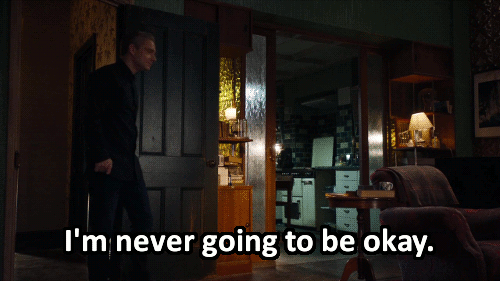
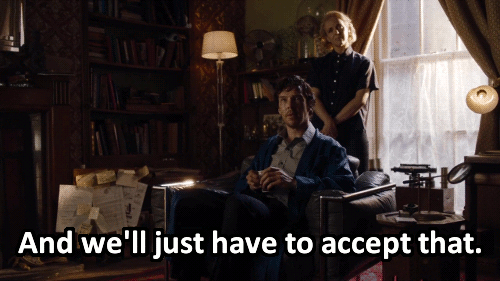
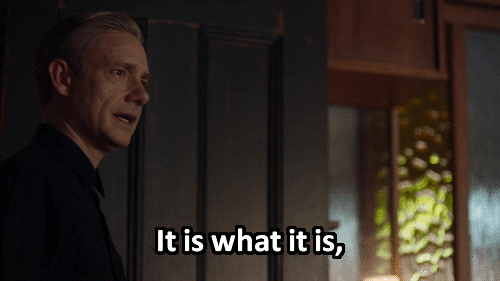
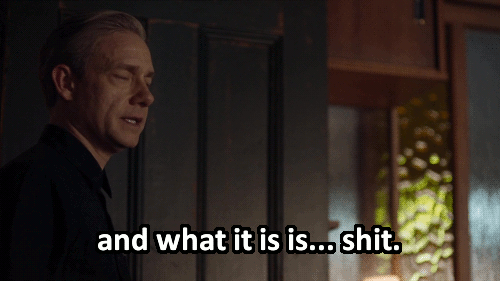
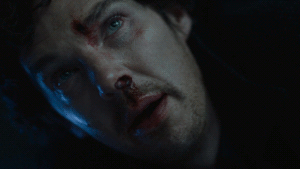

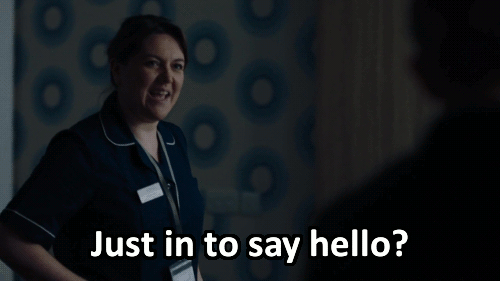
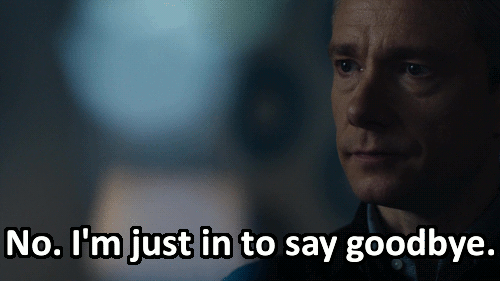
I really need TFP to sweep the rug out from under me.
I don't tend to leave fandoms. I think I'm into Sherlock for life. But I'm also thinking that I'm going to be one of those people who ignores canon after TRF.
I know that many viewers don't take what we're shown at face value. I know that the writers love to be clever and play tricks on their viewers. Still, I think it's important to always consider multiple perspectives and possibilities, so I have been entertaining the idea that we're seeing on screen is intended to be accepted exactly as shown. If that is right, I find the show heartbreaking in ways that have nothing to do with any shipping theories or arguments.
The events we have seen so far in series 4 -- if taken at face value -- have shown that this Sherlock Holmes and John Watson have become bad for each other. It's an interpretation that I'm distressed by, but can't put out of my mind. In full disclosure, I'm posting this partly because I want to be convinced that this interpretation is wrong.
When this show started, I loved the relationship between Sherlock and John. The way I saw it, they made each other's lives exponentially better. I think they each thought the other was amazing and cared for each other deeply. They were always both difficult, messed up, not necessarily good men, but they gave each other what they needed to be better and happier than they could have been.
Back when they were promoting the first series, we were told that John would humanize Sherlock and help him develop a softer side. I'm not sure whether or not this has happened. Yes, we have seen far more sweetness from Sherlock over series 3 and 4, but I believe we have also had a PoV switch. If the first two series were from John's perspective, then what we saw of Sherlock was what he was permitted to see. Perhaps these soft asides have always been there and we simply didn't have a chance to know about them. I think that if our perceptions of Sherlock in S3 and S4 were from John's point of view we would be seeing Sherlock very, very differently. He is still the sort of man who has so little consideration for the pain of others that he'd speak to a pair of grieving parents about their daughter under the conceit that their dead son wasn't important enough to deserve having his gender remembered. He still hurts people who aren't useful to him, or whose hurt may be convenient. I think it's entirely possible that exposure to John hasn't made a significant difference on Sherlock's humanity. I’m really not overly concerned about whether Sherlock has changed. In the end, I’m not sure he needs to. I bring the matter to attention to illustrate that these characters are meant to influence each other, and that sometimes those influences are more clear than others.
Since the Reichenbach fall, Sherlock has had at least two major drug relapses. One after the Watson wedding (which I thought was fair enough in reference to Holmes' drug use in The Sign of the Four) and one in response to Mary's death and John's reaction. Sherlock is miserable -- I believe suicidal -- without John, and I suspect that he's still better with John regardless of any "humanizing" or lack thereof, but I am no longer sure that John is better off with Sherlock.
I think it's reasonable to assume that believing that he had watched Sherlock kill himself all but destroyed John. I say this because of the acting choices made in that and the following scenes, and because John described Mary as the second person who saved his life. Mary was there to pick up the pieces of John after Sherlock fell. She did help him. In the wake of her death, he was left so broken that he started hallucinating her. If we take that at face value, I think it is only reasonable to conclude that he truly, deeply loved her. From what we've seen, the hallucinations would indicate that John grieved her far more intensely than he had Sherlock.
Mary helped John through his grieving process. He grieved for Sherlock, then he began to build a new life with her.
If Sherlock hadn't returned after The Reichenbach Fall, John would have lived in blissful ignorance of his wife's past. If he ever found out, it would likely have been through an event far less traumatizing than having her (temporarily) kill his best friend, which put a certain sort of spin on the information. He never would have felt inadequate in the face of Sherlock preferring her as a mystery-solving companion who was "better" at it than him. Without that trauma and those feelings of inadequacy, I don't believe he would have seriously considered an affair.
It was Sherlock who told Ajay who (Rosamund) Mary Watson was. He may have had information about her old identities on his flash drive, but since this new one was such a good disguise that -- again taking all of this at face value -- even Mycroft Holmes (who kept such close tabs on his little brother's companions that he abducted John immediately and confronted him with his therapist's notes, who had known that Sherlock was coming into extremely close contact with Mary, and who had worked with A.G.R.A. before) couldn't detect that she wasn't who she claimed she was, Ajay (with his fixation on his mysterious decision that she was the "English woman") would likely never have found her. If he had -- as we saw -- she could still take care of herself. It was Sherlock who led Ajay to Mary, and then Mary to her killer. Without Sherlock, Ajay would not have had the information he would need to go after the Watsons. Norbury would never have had any reason to encounter Mary. Mary's past was certainly a problem, but it was Sherlock who made it a dangerous one. John was wrong to blame Sherlock for Mary's death as he did. Sherlock did not force Mary to jump in front of a speeding bullet. Sherlock told John to come to the aquarium and sent Mary a text about curtains. Taking what we saw at face value, Mary's own actions were instrumental in her demise.
Even so, without Sherlock, we have every indication that Mary would still be alive.
Bad things would still have happened. Maybe the underground plot would have succeeded. Maybe Sholto would have died after the Watson wedding. Maybe Magnussen would have still tracked down and blackmailed Mary. Maybe someone else who was also apparently more competent than the man we're told acts as the British government would have. But if we take what the show has given us at face value, Mary could have solved that on her own. She could have shot Magnussen without being interrupted. The only consequences of his death came about because he was murdered in front of others while being filmed. Without Sherlock, he would have died without affecting John at all.
Would the Watsons be bored without regular adrenaline fixes? I think so. I think that would cause conflict. But I think they could raise their daughter happily enough together. Maybe they would need to occasionally go skydiving and participate in particularly intense paintball matches. Maybe activities like that wouldn't be enough. Maybe they'd find something else that would be; they're competent enough. The point is that Rosamund would have a living mother. John wouldn't be a single father passing his daughter off to friends while mourning. John wouldn't be hallucinating his dead wife from grief.
Sherlock came back, and his actions led to unbelievable pain for John. First through John's conception of how Sherlock had treated him (especially if we take the explanation that they told us was correct -- the one we saw given to Anderson -- as true) and then through the discovery that his wife's very identity was a lie. He started out with trust issues. His fears were justified. Betrayal was stacked upon betrayal by the people closest to him. Then the woman he loved died under his hands. I find it horrifying, but not at all inconceivable, that he ended up fucked up enough to do what he did in the morgue. He was entirely responsible for his own actions, no matter what state of mind he was in; I’m simply trying to convey that I found the outcome tragically believable.
If we are meant to interpret Mary the way they are telling us to, as a super competent ex-spy who did bad things but felt regret and wanted more than anything a domestic life with her loving husband and child, then our interpretations of everything else have to account for that. I know that many people in this fandom prefer -- for various reasons -- to interpret her as a villain. Due to the conclusion of this meta, I'll count myself among them. But, unless The Final Problem is going to retcon the last few episodes -- which I suspect is highly unlikely -- then she is the complicated, lovely woman that they have been telling us she is. And she's dead due to her association with Sherlock.
If we take everything we are seeing at face value (and I see why many people don't, but I dwell on it myself) then this John Watson would have been better off if Sherlock Holmes had died in The Reichenbach Fall. That is what I'm finding heartbreaking about this series.
I want this meta to be wrong. I keep reminding myself that no matter what, Thompson is writing The Final Problem and I usually love the way he writes Sherlock and John together. But even so, at this moment, I think BBC’s Sherlock is shaping up to be one of the most depressing Sherlock Holmes adaptations ever. It is what it is, but I know what I don’t want it to be.
Show me this is wrong. Please.
#Sherlock Holmes#Sherlock#sherlock meta#meta#sherlock s4#sherlock BBC#sherlock spoilers#sIp#stuff I made
17 notes
·
View notes
Note
Any new “Doctor John” type stories, O Great One?
Hi Nonny!
I certainly do! :D Here you are!
DOCTOR / CARETAKER JOHN Pt. 3
See Also:
Doctor / Caretaker John
Doctor / Caretaker John Pt. 2
New World, Old Words by thedeafwriter (G, 641 w., 1 Ch. || Deaf Sherlock, Sherlock Whump, Pining Sherlock, Marriage Proposal, Fluff, Always John) – It was disconcerting to experience. One second, he was laying on the table, breathing in the gas that would make him sleep, the next, he was dragging his eyes open to look around the bright room, trying to wake up.
Promise of Sussex by LittleLongHairedOutlaw (T, 705 w., 1 Ch. || First Person POV Sherlock, Sherlock Whump, Angst, Pining, Ambiguous Ending) – John tries to keep Sherlock conscious after he’s been shot on a case.
Idiot by Anesthesiologist (T, 1,229 w., 1 Ch. || Hurt/Comfort, Friendship, Alternate TGG / Explosion, BAMF John, Sherlock Whump, Inner Monologue, John Saves Sherlock, POV Sherlock) – What the heck happened? He remembered the pool and Moriarty, but then what? Had he been dying?
Angel by MrsNoggin (T, 1,513 w., 1 Ch. || Winglock, Friendship, Chromoesthesia, Drugging) – John is an angel. That can be the only explanation. A response to the challenging request for a realistic wingfic one-shot.
They’re Taking My Wisdom by whitchry9 (K+, 1,939 w., 1 Ch. || Hurt/Comfort, Drugging, Dentists, Friendship, Anxious Sherlock, Humour) – Sherlock goes to the dentist. Of course, being Sherlock, things have to be complicated. Oh and drugs. They’re always fun.
Stay by sussexbound (M, 2,067 w., 1 Ch. || Post TAB, Suicidal Ideation Mention, Implied / Referenced Drug Use, Kissing, Love Confessions, Frottage, Coming in Pants) – “Why? Why did you do it? Hmm…?” He takes a deep breath, waits, lets it out again. “Look at me.” There’s no denying him when he takes this tone. “Why did you kill him? Hmm…? For her? After…” A muscle twitches in the corner of John’s eye, and he clamps his jaw down tightly, swallows and sniffs a little before continuing. “For her? After everything she’s done?” “For you.” Before he can even stop himself. Just like that.
The Rational Machine by Solstice Zero (K, 2,924 w., 1 Ch. || Hurt / Comfort, Malnourishment / Fainting, Doctor / Minder John) – Sherlock passes out. John muses on the reasons why. Containing an absorbing case, two bags of shopping, and a few apples.
Better Late Than Never by sussexbound (NR (T), 3,021 w., 1 Ch. || Post-S4 / TFP Doesn’t Exist, Sherlock POV, Love Confessions, Drunk Sherlock / Sober John, John Takes Care of Sherlock, First Kiss, Jealous Sherlock, Emotional Turmoil) – He suddenly wants John Watson out of his bedroom, out of his flat, out of his life, because he has been lying to himself these last few months, he realises. He doesn’t want John here, not with the way things are. He doesn’t want 221b Baker Street to be nothing more than rest stop John returns to on his journeys between women. He doesn’t want to play co-parent if Rosie is going to be snatched away from him and placed in the arms of whatever nameless woman du jour John lands on next. He doesn’t want to keep being so careful, so generous, so, so…
The Oolong Disaster by unicornpoe (T, 4,151 w., 1 Ch. || John’s Beard, Fluff, Humour, Frustrated Sherlock, John Takes Care of Sherlock, Case Fic-ish, Pining Sherlock, First Kiss, Possessive Sherlock) – John has a beard. Sherlock has a panic attack.
Experiment by Gwen’s Blue Box (K+, 4,222 w., 3 Ch. || Non-Con Drugging, Hurt Comfort, Friendship) – Of course John has always known about his flatmate’s irregular sleeping habits, especially when they’re on a case. This time, however, the case is taking longer and longer, and soon John starts to worry. But there’s not much he can do, is there? Because drugging Sherlock isn’t an option. Not yet, maybe, but will it be soon? {{CW: John drugs Sherlock without his consent}}
Welcome Home, John by slashscribe (G, 5,504 w., 1 Ch. || Post-S3, Angst, Emotional Hurt/Comfort, Awkwardness, Stabbed Sherlock, Protective Sherlock, Panic Attack (Sherlock), Self Esteem Issues, Love Confessions, First Kiss) – When John moves back to 221B, he thinks he’s the broken one, but after a while, it becomes clear that he might not be correct.
He’s Not Paid Enough to Deal with This Shit by janonny (T, 9,828 w., 1 Ch. || Personal Assistant AU || Humour, First Meetings, Snarky John) – One of the first things John did was to write up step-by-step instructions on how to conduct a proper job interview before handing it over to Mycroft for his perusal. There were no kidnapping, deserted car parks or stolen therapy notes anywhere on that list. (Or the one where John returned from the war and ended up working for Mycroft as his personal assistant slash doctor on retainer. Everything was fine, until he was sent to post bail for one Sherlock Holmes.)
And Here We Are by J_Baillier (T, 12,416 w., 2 Ch. || ASiP Fic, Alternating First Person POV, Drama, Friendship, Mild Case Fic, Autism Spectrum Sherlock, Insecure Sherlock, Protective John, Pining, Homophobia, Loneliness, Angst, Humour, Domestics, Morbid Fluff, Kidnapping) – All the little things we never got to see when an army doctor and a consulting detective were adjusting to sharing a flat. And a life.
Shuteye Shenanigans by Ayakae (K+, 13,263 w., 8 Ch. || Post-TRF, Friendship / Epic Bromance, John’s Nightmares, Angsty Fluff, Bed Sharing, Humour, Cuddles, Taking Care of Each Other, Domestics) – John Watson has never slept with Sherlock Holmes. Never ever ever. And never will, thank you very much. Well, there was that one time, but John didn’t count that. It was completely different, just like the second time it happened. And the third. And the fourth. Epic bromance, but it can be read as pre-slash if you wish.
First Response by Arwen Jade Kenobi (T, 13,516 w., 8 Ch. || Hurt/Comfort, Friendship, Five and Ones, Whump / Injury) – Five times John had to perform first aid on Sherlock and one time Sherlock had to perform it on John.
Pattern Behaviour by SilentAuror (E, 14,835 w., 1 Ch. || POV First Person Sherlock, Jealous Sherlock, Pining Sherlock, Introspection, Stroppy Sherlock, Light Humour, Friendship, John Takes Care of Sherlock, First Kiss/Time, Wall Kisses, Fluffy Angst, Happy Ending) – Sherlock doesn’t even know why he resents John’s dates so much. Until the day he does know. Slight angst, unrequited feelings (but don’t let that scare you off!)
Software Malfunction by tiger_in_the_flightdeck (E, 16,679 w., 1 Ch. || PODFIC AVAILABLE || Android Sherlock, Love Story, Unhappy Ending, Angst, Suicide, Jealousy) – “You think I can’t love you? Just because you’re made with metal, and detailed programming?” The doctor propped himself on his elbow, and looked down at it. “I am nothing but blood and bone, and tissue. Things just managed get mashed together in a manner that made me like this. Just like you were put together to make you how you are. When I kiss you-” he did so, briefly, to prove his point. Then more deeply, and lingering, because he could. “When I touch you, or smile at you, does it make you feel different from when others have done it in the past?”
Turn Left at the Park by Glenmore (NR (E), 37,409 w., 28 Ch. || Alternate First Meeting / ASiP Divergence, Case Fic, Depression, Suicidal Ideation, Loneliness, No Mary, Possessive Sherlock, Fluff & Angst, Nightmares/PTSD, Sherlock Saves John, Sherlock Whump-ish, Doctor John) – So what would have happened if John hadn’t walked through the park and met Stamford?What if, instead, he walked around the park and just went home?
A Hundred Crimson Sols by elldotsee (E, 55,536 w., 16 Ch. || Astronauts AU || Mars Exploration / Space Travel, Slow Burn, Shy Sherlock, Scientist Sherlock / Biomed Engineer John, Alternating POV, Mutual Pining, UST, Angst with Happy Ending, Domestic Fluff, Hurt/Comfort, Injuries, Suicidal Ideation, Zero-G Sex) – Will Holmes is a chemical researcher recognized widely for his contributions to the new Mars exploration program. Thanks to his ground-breaking developments, the IMMC (International Mars Mission Corporation) is one step closer to Martian colonization. Will and his team of scientists are headed out on the first of three manned missions before the first group of settlers arrive. Three days before launch, one of the crew has to be replaced. Will panics because…new people. The replacement is of course one John Watson, biomedical engineer and space hottie who was pretty sure he had retired from actual space exploration and was now content to work in the nice, quiet research lab. Can the crew survive this TOTALLY ROUTINE trip? Will they be able to endure each other for the looooooong trip in close quarters? Gonna be a wild ride… prepare for blast off. Part 1 of the SpaceBois go to Space series
The Vapor Variant by 88thParallel (CanadaHolm) (M, 72,684 w., 18 Ch. || PODFIC AVAILABLE || Post-THoB, John Whump, Protective Sherlock, Guilty Sherlock, Anxious/Worried Sherlock, Virgin Sherlock, Angst with Happy Ending, Hurt/Comfort, PTSD John, Slow Burn, Mutual Pining, Suspense, Virus, Sickfic, Big Brother Mycroft) – They stood face to face in the middle of a clearing. The dim light of the moon barely allowed Sherlock to see the glassy terror in John’s eyes and the sweat that glistened off his forehead. His nose was bleeding again, blood dripping in a slow stream from his right nostril. They were both gasping for air, John’s eyes locked on Sherlock’s. There was no recognition there, just wild animal fear. Time stood still for an eternal few seconds, and Sherlock took a shaky breath. “John—”Spell broken, John spun and bolted back into the woods. Still heaving for air, Sherlock took off after him.
Summit Fever by J_Baillier (M, 78,802 w., 18 Ch. || Mountain Climber AU || POV John, Angst, Tragedy, Suicidal Ideation, The Himalayas, Mountain Guide / Doctor John, Mount Climber Sherlock, Loneliness, Drama, Suspense, Slow Burn, Injured Sherlock / Sherlock Whump, Pining John) – After graduating from medical school, John Watson followed his heart to the Himalayas. Ten years later, he’s a haunted cynic working for his ex-lover’s trekking and mountaineering company. Will leading an expedition to Annapurna I—the most lethal of all the world’s highest mountains—shake John out of his reverie, and who is the mystery client added to the group at the last minute?
The Wedding Garments by cwb (E, 105,390 w., 36 Ch. || Alternate Future AU || Alternate First Meeting, Dating / Arranged Marriages, Romance, First Kiss/Time, Heavy Petting, Cuddles, POV Sherlock, Virgin Sherlock, Idiots in Love, Slow Burn / Falling in Love / Dev. Rel., Nervous/Anxious Sherlock, Jealous/Cranky, Hiking, Vacation Homes / Honeymoon, Sherlock’s Family, Horny John/Sherlock, Patient John, Massages, Hand Jobs, Assassination Plots, Hand Jobs / Oral Sex, Case Fic, Emotional Love Making, Bath Time Fun) – This is the story of a young consulting detective who wants nothing to do with marriage and an army doctor who wants to find true love. It’s 2020 post-Brexit England and the British government is encouraging arranged marriages. Candidates meet through state-run agencies and date in hopes of finding love (and tax benefits). Sherlock doesn’t need or want a spouse, at least not until John Watson shows up. Hesitant to give in to his more carnal urges because of the way they derail his mind, how will Sherlock progress toward the more intimate aspects of a relationship? The answer lies in a very special wedding gift.
154 notes
·
View notes
Photo
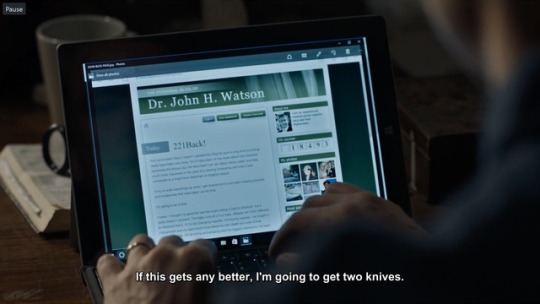
Justifying Holmes/Watson or Johnlock as a Player in the Drama (Part I)
What if you’re trying to justify John’s place in Sherlock’s life, but you can’t do it via the meta or screenshots we use? If you’re any of the actual players in the drama (and this makes it possible to pair with trance or EMP theories), you have to quickly push it all together to tie up those ‘loose ends’?
John’s odd blog jpeg from T6T is shown above. Nappies, which means diapers he shouldn’t even be needing yet (unless this is a projection *coughs*) or it also means a large circular platter (if your thoughts run to reflective items and circles of thought--which they should--read the linked meta. We already know that S4 is basically the previous seasons, done backward.)
In order to hold up his place, according to some, John would have to continue on cases with Sherlock and keep writing his blog. Lestrade becomes fixated on the idea in S4, which seemed very strange, except if you’re reviewing the blog and fitting in additional information. Also, in canon ACD and Granada adaptations, this is in keeping with why Watson began writing down the cases for publication. Most of the time, and it’s mentioned more than once, Holmes wasn’t receiving credit in the newspapers for his solving of the crimes--it goes to the multiple lead investigators. Remember this point for later.
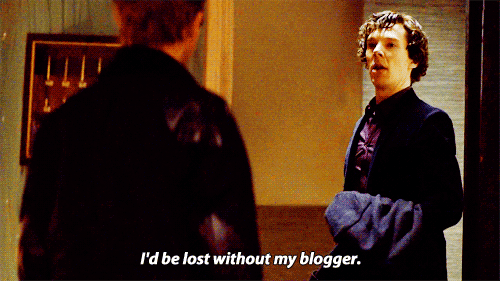

Lestrade is afraid...And Sherlock comments his Boswell is learning...
Not fast enough, Sherlock...
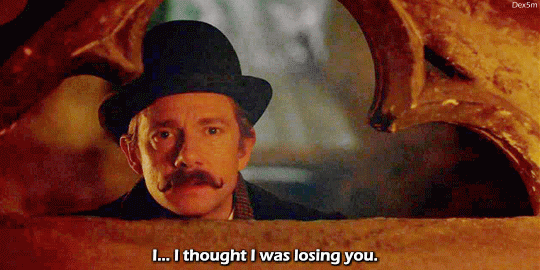
Sherlock thought John meant him, but John says he was talking to Mary, so this fanciful solution (7% or otherwise), isn’t working out for Sherlock. Mycroft asks modern John to look after Sherlock, but the end of the special tells us that such a thing never happened, because we’re still in 1895. It’s echoed in S4, by John having a full time job, being a husband, and then also a father. TFP ends Sherlock asking Lestrade to do exactly the same thing with Mycroft, and Lestrade finally saying Sherlock is a good man (going back to ASiP).
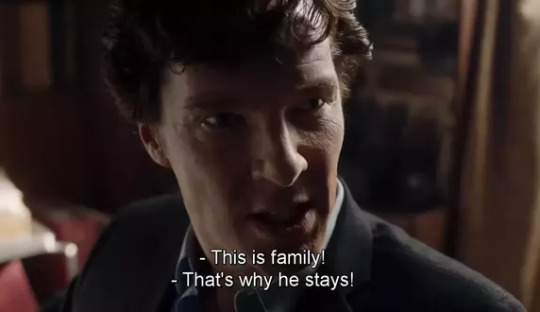
NEW OPENING (VICTORIAN) TITLES (with a Victorian twist to the theme tune). Close-up on an issue of The Strand Magazine. Nearby, a news vendor is calling out to the passing pedestrians. He is holding newspapers and another copy of The Strand with a small red sleeve around it on which are the words “SHERLOCK HOLMES” and an in-profile white silhouette of the detective. Offscreen, carollers can be heard singing “Hark! The Herald Angels Sing.” NEWS VENDOR: Papers! Papers! (A hansom cab approaches along the street.) NEWS VENDOR: Papers! Papers! (The cab slows down as Watson leans out of the window a little and gestures to attract the attention of the vendor.) WATSON: Here. (The cab stops.) WATSON: How’s ‘The Blue Carbuncle’ doing? NEWS VENDOR: Very popular, Doctor Watson. Is there gonna be a proper murder next time? WATSON: I’ll have a word with the criminal classes. NEWS VENDOR: If you wouldn’t mind. (He points towards the figure sitting next to Watson.) NEWS VENDOR: Is that ’im? Is ’e in there? (Holmes, mostly obscured from the vendor’s view, apparently kicks Watson, who grunts.) WATSON: No. No, no, not at all. (He tips a finger to his hat.) Ah, good day to you. CABBIE (to his horse, shaking the reins at it): Walk on. (The cab sets off again. The news vendor calls after it.) NEWS VENDOR: Merry Christmas, Mr Holmes!
The Blue Carbuncle. This is interesting, because that case isn’t on 21st century John’s blog. According to John, it wasn’t a case interesting enough for Sherlock to take on, and they go through a series of comments about Bond films and cat videos. The other option is The Adventure of the Mazarin Stone.
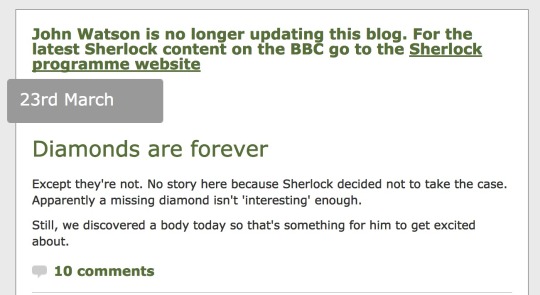
The Adventure of the Mazarin Stone was one of two instances where the original canon story was written in third person. It was based on a play, and Watson was barely in it. The other story was His Last Bow (HLB). The action in TAotMS all takes places in one room, rather similar to the beginning of TAB. The plot twist comes that the play has been what Holmes has overheard of a conversation between two criminals. Now, apply this idea to the one that Sherlock is still unconscious in hospital, but capable of overhearing and processing what is heard around him. It echoes Sherlock’s comment in TAB about his MP being able to do things more than what Mycroft knows, and Mycroft agrees.
Be sure to read @jenna221b meta about how the cases are twins, and fixes are being added in as well as Sherlock S4 as Epic Theatre.
In Terror By Night, which we know Mofftiss used in MHR, includes aspects from TAofMS. In Granada adaptations, this case was merged with The Three Garridebs, which were practically absent in S4 of Sherlock.
Mofftiss would have us believe all we got was the three men hanging around at the mercy of Eurus, but I’ve been working with the idea that Moffttis is re-enacting the post Reichenbach behavior of Holmes and Watson from Granada. Hardwicke replaced Burke after TFP (comparable to Sherlock TRF), and Johnlock wasn’t the same afterward. It takes several episodes before it returns to the warm, close physical proximity, flirtatious pairing we see before Holmes “dies” and Burke was replaced.
Interestingly, the cases that do show it, are the ones where Mofftiss borrowed the most from Granada. Granada The Devil’s Foot, Sherlock S4 Imagery, and Moriarty or Mortimer & A Little Glimpse Into Granada’s ‘Eligible Bachelor’ by @ebaeschnbliah (Also interesting that we posted these meta within hours of one another, without having talked about the influence factor at all.) As you can tell from the second meta, Eurus had an obvious reference in EB (although The Musgrave Ritual--which is used in Sherlock TFP), also gave a visual hint via Rachel, the one that allowed a man to die down a hole, and it showed the coming revival of Johnlock closeness--although it wouldn’t happen until TDF. If you don’t think that’s important, remember that Moffttiss said TD12 as a name only happened, because the name they wanted to use was taken. While writing this, I found a similar meta to mine about TDF by @devoursjohnlock Maybe I am helping connect dots...
From this meta by @may-shepard we see that Doyle’s story The Parasite, coincides with S4, and the also the dates from the story fill in the missing dates on John’s blog.
At the end of TLD, John and Lestrade are discussing the morgue incident. They specifically mention HLV (HLB in canon). It seems like they are wrapping up those loose ends Sherlock doesn’t like to have on his watch, but he’s been in hospital, even though according to what Sherlock and Mycroft know from T6T--the loose ends from HLV are already edited and he’s free of that.
According to TAB, all the modern elements we know of from Sherlock, are all lunatic fantasy...or metaphorical flights of fancy...Holmes theorizes it could come to pass, but only after the echo of the idea of having proper murders. Moffttis was adamant that Mary had to die, because that’s how it was in the stories, but it isn’t. We’re never told what happened to Mary.
TAB
Shortly afterwards, the car pulls away and drives off along the tarmac. As the scene fades out, the familiar ‘Pursuit’ music starts ... and almost immediately grinds to a halt. The screen remains dark for a moment and then ... WATSON (offscreen): Flying machines; these, er, telephone contraptions ... (The screen fades up to reveal Holmes and Watson sitting in their armchairs in the sitting room of 221B. Each of them is smoking a pipe.) WATSON: What sort of lunatic fantasy is that? HOLMES: It was simply my conjecture of what a future world might look like, and how you and I might fit inside it. (Watson nods.) HOLMES: From a drop of water, a logician should be able to infer the possibility of an Atlantic or a Niagara. WATSON: Or a Reichenbach. HOLMES: Have you written up your account of the case? WATSON: Yes. HOLMES: Hmm. Modified to put it down as one of my rare failures, of course? WATSON: Of course. (Holmes looks thoughtful for a moment.) HOLMES: “The Adventure of ... the Invisible Army.” (Watson looks upwards, considering it.) HOLMES: “The League of Furies”? (He leans forward, smiling.) “The Monstrous Regiment.” WATSON: I rather thought ... “The Abominable Bride.” HOLMES (sitting back): A trifle lurid. WATSON: It’ll sell. It’s got proper murders in it, too. HOLMES (pointing his pipe at him): You’re the expert. WATSON: As for your own tale, are you sure it’s still just a seven percent solution that you take? I think you may have increased the dosage. HOLMES: Perhaps I was being a little fanciful ... (He looks down thoughtfully.) HOLMES: ... but perhaps such things could come to pass. (He stands up.) HOLMES: In any case, I know I would be very much at home in such a world. (Watson chuckles as Holmes walks across the room towards the right-hand window.) WATSON: Don’t think I would be. HOLMES: I beg to differ. (He looks out of the window.) HOLMES: But then I’ve always known I was a man out of his time. (He puts his pipe in his mouth and continues to look out of the window. The ‘Pursuit’ theme starts again, this time with a Victorian twist to it, as the camera slowly pulls back. Down in the street below, customers are going into SPEEDY’S Sandwich Bar & Cafe while more people – all dressed in modern-day clothing – walk past, and the road is busy with cars. A black cab passes a number 11 bus – destination Baker Street – as they drive past 221B ... ... where it is always 1895.)
Transcript ( x )
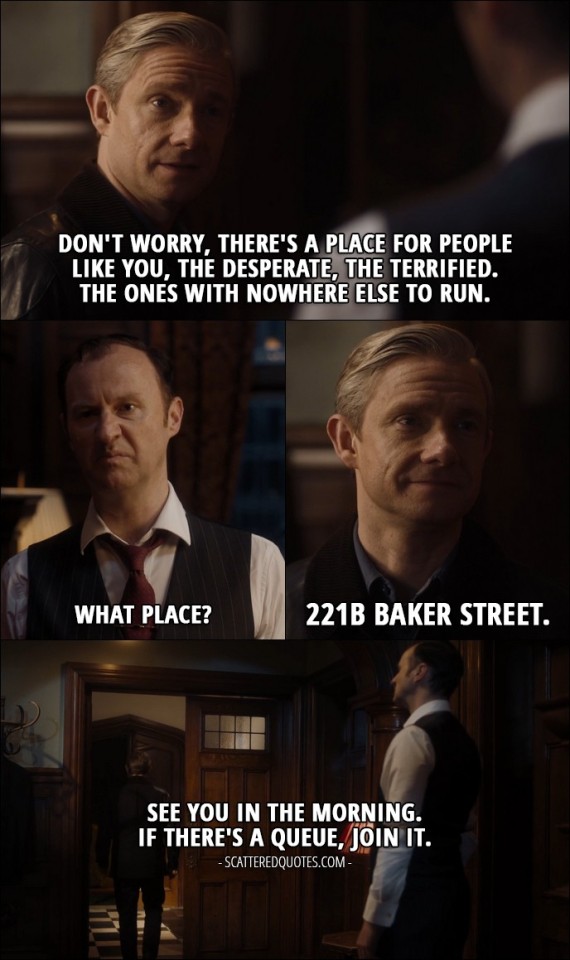
So, if you’re going through the list of cases (as one of the players), you don’t always have to be present or in the physical framed shots of the events in order to do so. Remember how John was disappearing in shots from T6T, when Lestrade and Hopkins were present, and how Sherlock was working with multiple investigators regularly--not just Lestrade? It happened against in TFP, while Sherlock is trying to negotiate in Sherrinford with Eurus.
This is more in keeping with ACD and Granada, because Lestrade wasn’t the lead on all the cases. That he should be in most of Sherlock S1-3 made no real sense, so this is someone trying to cover their bases and possibly justify John’s continued existence in Sherlock’s life, through the filter of something other than being a couple. It still works though if you’re John, Lestrade, Mycroft or even unconscious or tranced Sherlock trying to show why John’s place by his side is vital--without giving away the romantic element (because to Sherlock, the romantic part is a mystery--he’s been unconscious since S2 or HLV).
41 notes
·
View notes